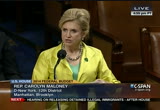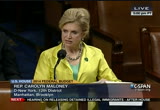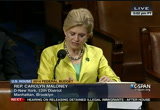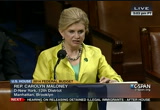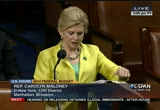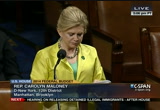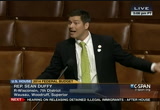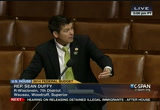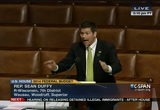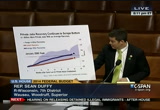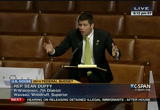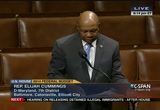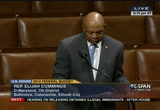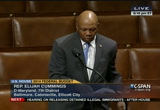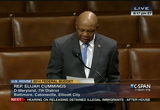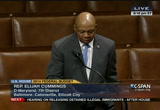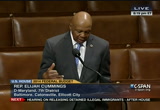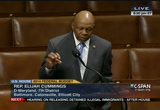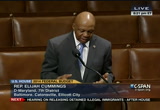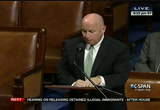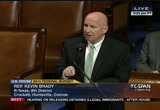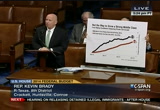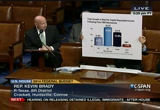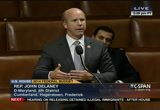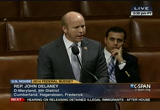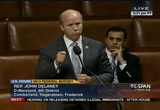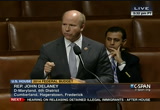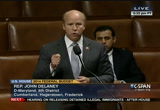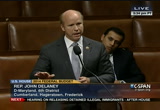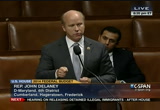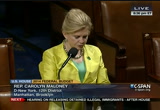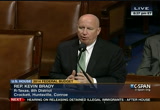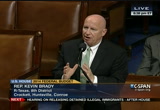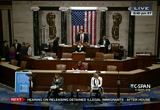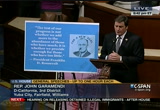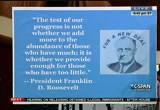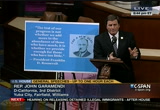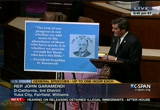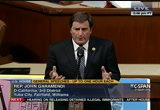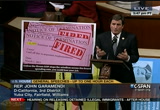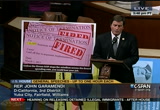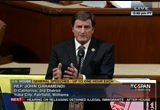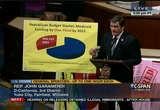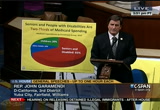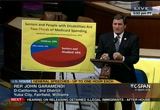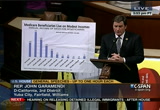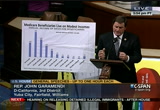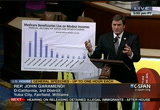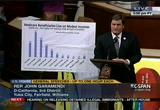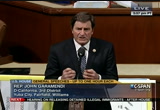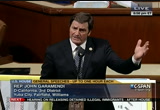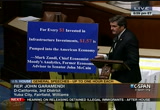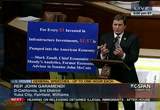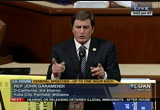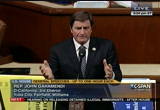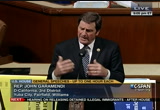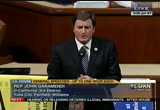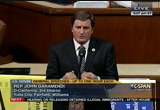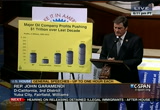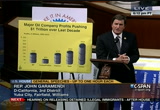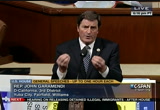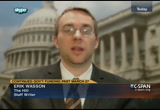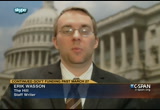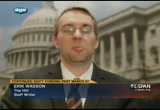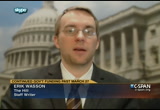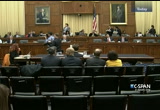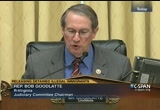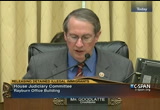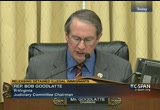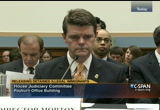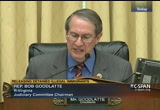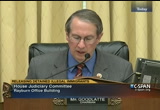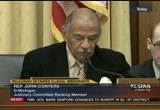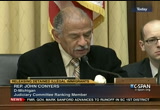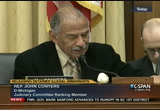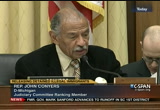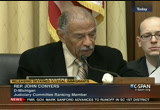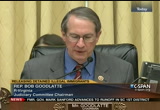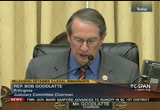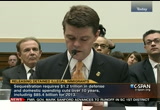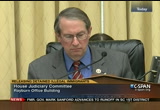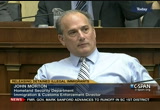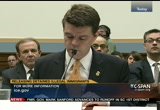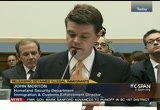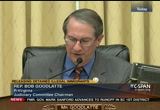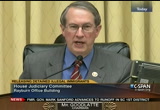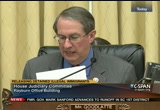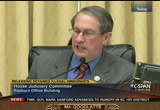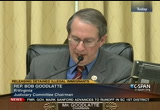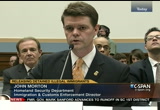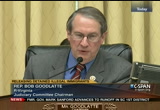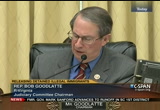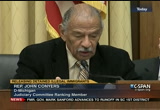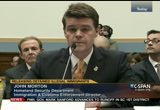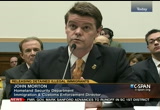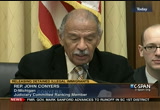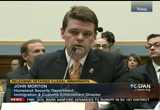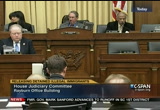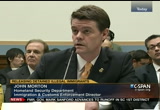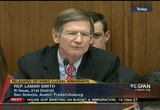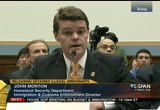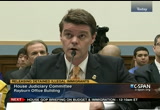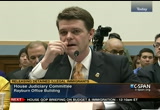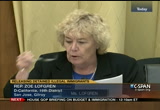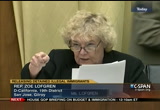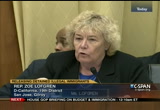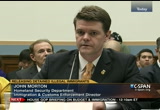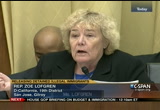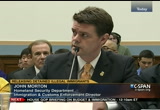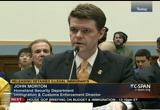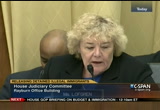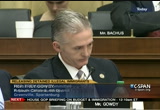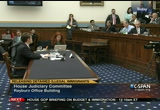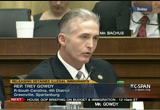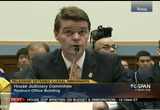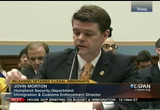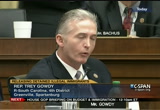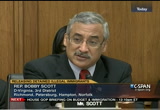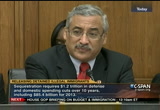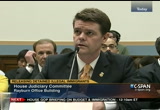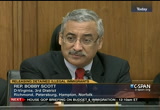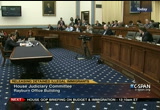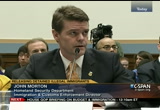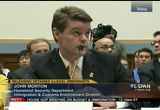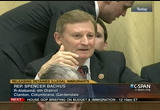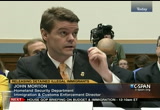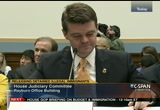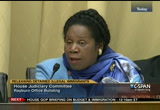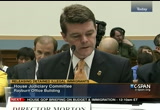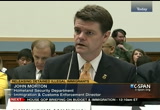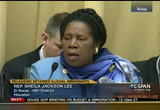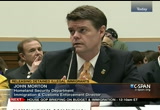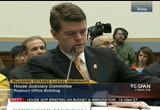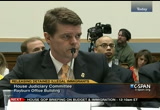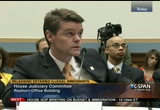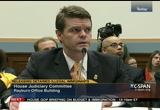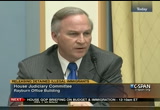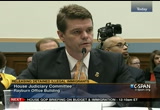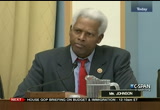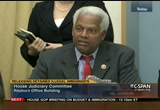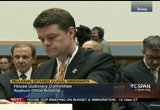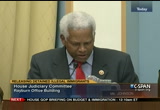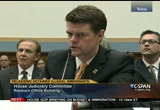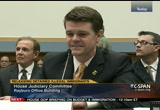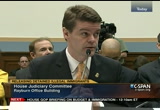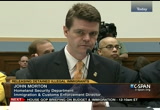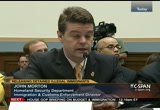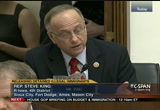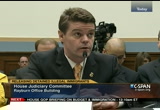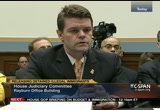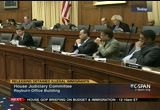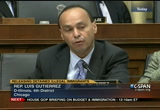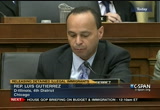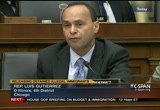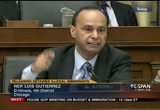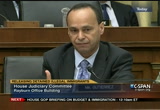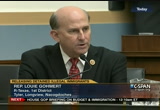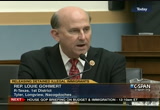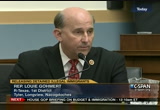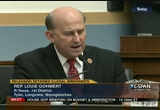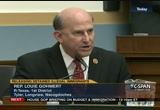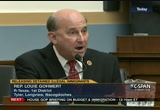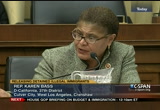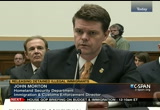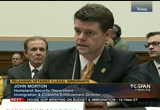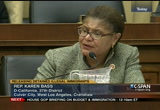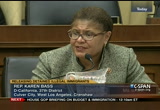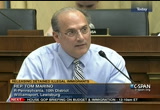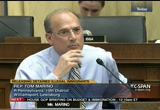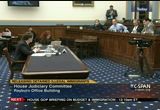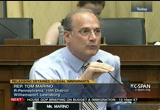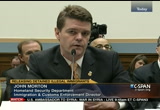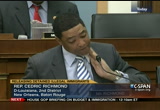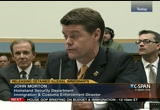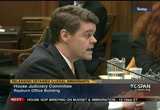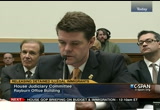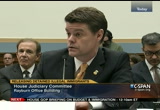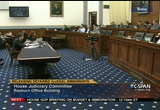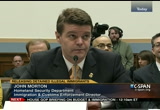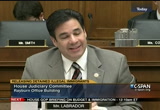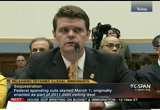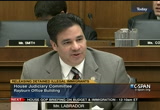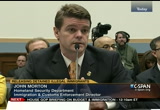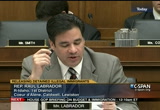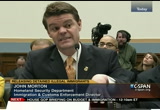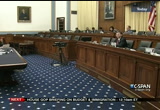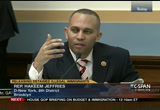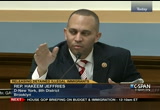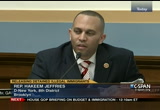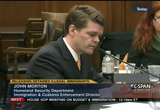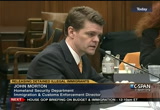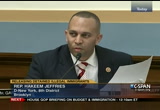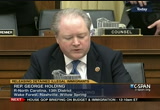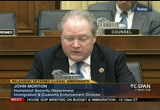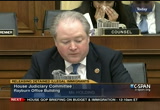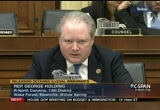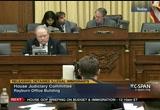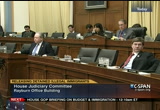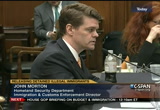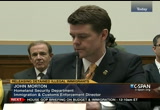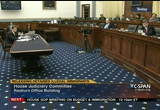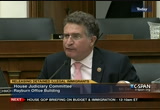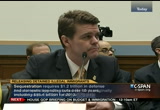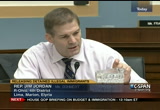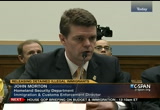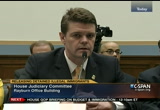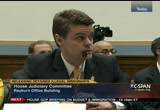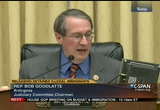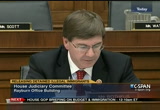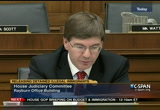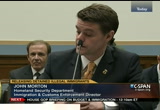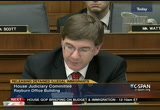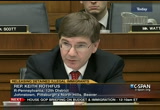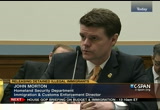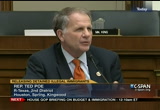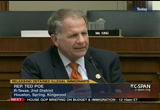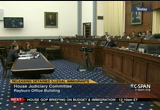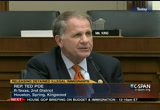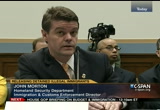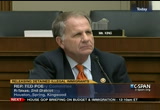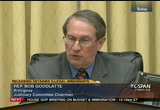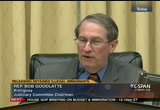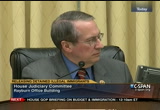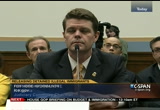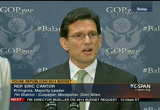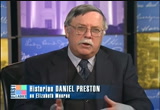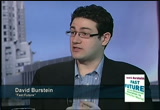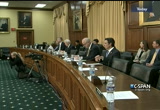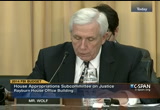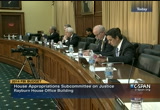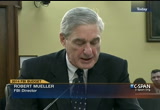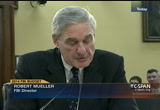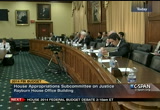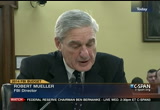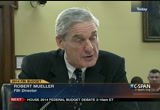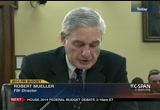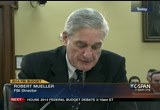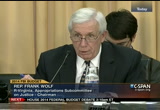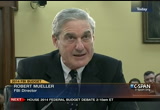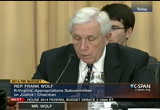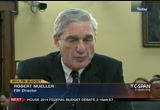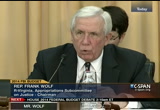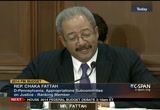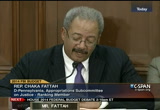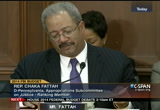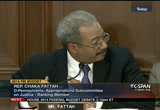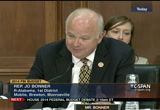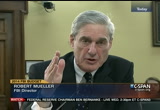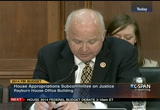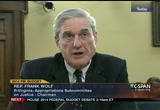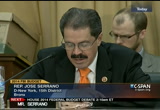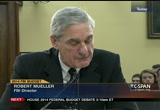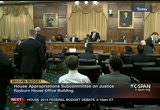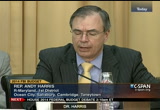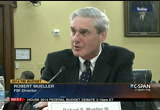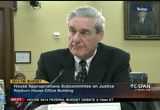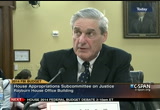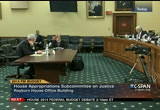tv Capitol Hill Hearings CSPAN March 19, 2013 8:00pm-1:00am EDT
8:00 pm
more than 2/3 are women. the ryan plan repeals the affordable care act which would sharply cut the overall level of health care available to tens of millions. yet to make his budget balance, ryan counts the $716 billion in medicare savings from the affordable care act. it's a hoax of epic proportions. repealing the affordable care act would return taos a time when insurance companies could charge women more, it's called gender rating, just for being a woman. repealing the affordable care act would also eliminate the ban on discrimination against those with pre-existing conditions, the ability to remain on parents' health plans until age 26 and the expansion of medicaid. and while tens of millions of
8:01 pm
americans were struggling under he harsh new austerity measures, the ryan plan would cut tax billers in most fortunate. last year the joint economic committee estimates that ryan's tax plan would lower taxes for millionaires by about $300,000 while raising taxes for individual taxpayers earning between $30,000 and $100,000 by over $4,000. how fair is that? at a time when income inequality is widely viewed as a very serious problem in our country, the ryan plan would make it worse. the gap between the haves and the have-nots would grow larger under the ryan plan. the ryan plan would ask tens of millions to bear additional burdens, pay additional taxes, face additional hardships.
8:02 pm
while it cut taxes for the fortunate few and preserved loopholes for big oil and spent an additional half million dollars on the military over the next 10 years. and at the end of a decade of paying -- of painful cuts, according to the nonpartisan tax policy center, the ryan budget would have managed to actually add $5.7 trillion to the deficit . a close look at the math makes it clear that the ryan budget can't recoup the revenue lost from its tax cuts without imposing large tax increases on the middle class families. the tax policy center was unwilling to speculate on where the lost revenue would come from. in addition to the economic
8:03 pm
policy institute estimates that e ryan budget would kill 750,000 jobs this year, two million next year and increased gross domestic product by 1.7 percentage points. the priorities of this budget are all wrong. it kills jobs, stifles growth and adds to the deficit. all while making life harder for seniors, women, children and the most vulnerable in our society. the math of the budget just does not add up. simple arithmetic tells you that the only way to pay for mr. ryan's proposed tax cuts for the fortunate few is to eliminate many of the deductions that middle class families count on to pay for housing and health care and to save for their retirement.
8:04 pm
the ryan tax plan would further burden those who are struggling by substantially lowering taxes for the most fortunate and that's not spend, that's just plain math -- spin, that's just plain math. the vision this budget offers of america is tuth totally at odds -- is totally at odds with who we claim to be. it's a vision of the country where the government is indifferent to the suffering of many while only paying attention to the demands of a few. then there is the other plan that is before us, the democratic plan. with a balanced set of priorities, a better vision for the future, found in the budget offered by house budget committee ranking member chris van hollen. it takes a balanced approach with targeted spending and new revenues. it would cut waste, add jobs and spur economic growth of the
8:05 pm
economy. it would reduce the deficit by an additional $1.8 trillion without jeopardizing the recovery or harming the middle class. it includes $1.2 trillion in new revenue obtained not by tax increases but by closing loopholes and eliminating wasteful spending that benefits the wealthiest americans and the largest corporations. it eliminates $4 billion in annual tax breaks to the oil and gas industry, an industry that is making profits. they don't need a tax break. in fact, they're making enormous profits. so, why does the ryan budget give them a government subsidy? the democratic plan invests in infrastructure, education, job
8:06 pm
training and innovation. it is designed first and foremost to help create jobs and strengthen the economy. the house democratic budget also makes critical investments in our future. $200 billion is invested in infrastructure, education, job training and innovation. helping to create jobs and strengthen the economy. these investments include $80 billion for an education jobs initiative, $50 billion for transportation needs and $10 billion for infrastructure -- for an infrastructure jobback -- bank. as federal reserve chairman ben bernanke has said many times over the past few years, simply pursuing deep cuts in the short-term will slow the rate of economic growth and bring down revenues and lead to less deficit reduction.
8:07 pm
we have two paths before us. we can choose a path of austerity and indifference that will limit economic growth and increase inequality or we can choose one of inspiration and inclusion that invests in our country and creates opportunities for everyone. i choose opportunity over austerity and urge my colleagues to reject the ryan budget and support the budget offered by mr. van hollen and the house democrats. i reserve the balance of my time. and i have two additional speakers. the chair: the gentlelady her time.
8:08 pm
the gentleman from texas. mr. brady: mr. speaker, i yield to the gentleman from wisconsin, a key member of the joint economic committee, three minutes. the chair: the gentleman from wisconsin is recognized for three minutes. >> i appreciate the gentleman for yielding. i want to shed a little light on what's been discussed on the floor tonight, mr. chairman. we hear a lot of conversation about medicare. mr. duffy: we have to be clear that in obamacare, this bass the -- this was the longest health care reform bill this bill has ever seen. it's going to spend $2 trillion of deficit spending over the next 10 years. and with that massive new health care reform bill, guess what? medicare is going broke in 10 to 12 years. so with this great health care reform, they didn't have enough foresight to save our seniors medicare -- our seniors' medicare program. the program they've actually paid for over the course of their lifetime. i think our seniors deserve better than what they have received in obamacare. we hear a lot about what we've done with the $716 billion in
8:09 pm
obamacare. let's be clear between the two plans. my friends across the aisle want to take $716 billion of savings from medicare, take that money out and use it for a different set of people in obamacare. using it for people who didn't pay for the program. on our side of the aisle we want to take that savings and use it for our seniors. it's their money. they deserve to get it. and use it to shore up the program. this makes sense. you talk about facts and numbers. think back to what the president told us with obamacare. he said, listen, you're going to see your health care costs go down by $2,500 a year per family of four. the truth? what happened? health care costs went up by $3,000 a year for a family of four. that's a $5,500 turnaround for a family of four in this health care reform bill.
8:10 pm
listen, that's a lot of money for a hardworking american family. let's talk about what else has been discussed on my friends across the aisle. if you recall the stimulus bill, $1 trillion of spending, remember? we were supposed to spend $1 trillion and get an unemployment rate by 2013 of 5.2%. well, the reality is we're sitting at 7.7% but if you add back in everyone who stopped looking for work because they can't find it, because this has been one of the longest and lamest recoveries since the great depression, it's actually up at 10%. listen, these policies and these promises haven't worked for the american people. let's talk about taxes. we have a plan that will reform the tax code. it will make it fairer, flatter, simpler, easier to use and we root out the loopholes, take away the preferences, the exemptions. we get away from crony capitalism, a fair code.
8:11 pm
you have a chance to vote for that kind of tax reform in our budget. but let's compare that to what my friends across the aisle proposed. well, $1 trillion in tax increases in obamacare, $600 billion of tax increases in the fiscal cliff and another $1.2 trillion -- mr. brady: i yield an additional the gentleman from wisconsin. the chair: the gentleman is recognized. mr. duffy: another $1.2 trillion in this new proposal for a total of $2.8 trillion of new taxes. listen, we've seen this before. this is tax and spend liberalism at its finest. listen, i think the american people understand what's happened in this very slow recovery. this is a chart the chairman showed earlier, but you see the growth rate in the red line of all we've seen in this recovery and you see the average of growth rate of other recoveries from other recessions. and the difference is four
8:12 pm
million jobs between this recovery and the average recovery. well, that's four million families that don't have work, that aren't paying for food on the table and a roof over their head. these are real people, real families in places like central and northern wisconsin that have been impacted by this economy. as chairman ryan talks about, we have a choice of two futures. and my democrat colleagues across the aisle want this massive debt and deficit to be our future for our children. we think there's a better way. we look at being responsible and paying off our debt in a way that's going to work for not just this generation but future generations. what are we doing? we owe $17 trillion in debt. we borrow $1 trillion every year and there's no end in sight. and we're printing money to buy our debt. and you say keep going, keep printing, keep borrowing, keep
8:13 pm
spending. this is going to end well, you tell us, or you tell our american families. give me an example of where printing, borrowing and spending ends in economic growth, prosperity, wealth or sustainable jobs. let's go back to fiscal responsibility. let's live within our means in this country, pay down our debt, do what's responsible and leave our children a brighter future. i yield back. the chair: the gentleman's time has expired. the gentlelady from new york. mr. maloney: i thank the gentleman. the republican house budget merely shifts health care costs to families. it makes no attempt to bend the curve, to lower health care costs. and the voucher program for medicare will only mean that seniors will be paying more for health care, by some estimates, as much as $5,900 per person and that's why the aarp and other independent organizations that track health care and benefits for seniors are so opposed to
8:14 pm
it. i now yield seven minutes to the distinguished gentleman from the great state of maryland, elijah cummings, seven minutes. the chair: the gentlelady from maryland -- the gentleman from maryland is recognized for seven minutes. mr. cummings: i want to thank the gentlelady for yielding. over the past three years, nearly six million new jobs have been added to the american economy and the unemployment rate has fallen to 7.7%. although this is real progress from where we were during the financial crisis inherited, i remind you, inherited by president obama, we can do far more to boost economic growth and continue to create jobs. the american people deserve a budget that supports economic growth, responsibly reduces long-term deficits and ensures equal opportunity for all. chairman ryan's recent budget
8:15 pm
does not satisfy any of these goals. instead it will slow economic growth, increase the unemployment rate, cut critical investments in our nation's future and harm our seniors all while protecting the interests f the wealthiest americans. the ripe budget would lower the middle class tax rate while hitting millions of dollars of additional taxes every year. nearly 30 million middle income americans would lose their health insurance because of the repeal of the affordable care act and tens of millions of the would lose coverage because of ryan's plan to gut medicaid. we can do better. it would destroy the commitment
8:16 pm
we made to our nation's seniors, by turning medicare into a voucher program. it would shift the rising cost of health care onto those very american who was already suffered deep financial shocks in the recent fiscal crisis. many of them have lost their homes, lost their health insurance, lost their jobs, lost equity in their homes, lost their savings, and yet we want the ryan -- and yet the ryan budget would break another promise to them. in a profoundly cynical mood the ryan budget would revoke those provisions of the affordable care act that would expand access to care while keeping in place the revenue generated by the act. the ryan budget also guts investments in science.
8:17 pm
job tructure and all the growth as well as the future of our children. if you don't believe it, talk to the doctors at n.i.h., the ones who worry whether they'll be able to complete the esearch they're doing. i was told a few years ago there were certain types of cancers that were deadly and now because of the research at n.i.h. they are chronic. i don't know how you put a price tag on somebody's life. this budget would reduce nondefense discretionary spending including core social services that middle class families rely on by an additional $700 billion over the next 10 years. below the senseless cuts already required under the
8:18 pm
sequester. and his plan, mr. ryan's plan, repeats past attacks on federal employees by cutting the work force by 10% over the next decade and requiring federal workers to contribute an additional $132 billion to their retirement plans. to justify these proposals, the majority continues to argue their policies and support austerity such as sequestration will solve our fiscal problems and magically create prosperity for all. in fact, the stale theories would do nothing but harm hardworking americans and our seniors. that is why the american people resoundingly rejected this theory just as fast -- just this past november, not very long ago. last week, the joint economic
8:19 pm
committee convened a hearing to examine constructive measures to stabilize our economy and decrease our long-term federal debt. testifying before our committee as alice rivlin, a well--- well-respected who served as founding director of the congressional budget office, director of the office of management and budget and federal reserve vice chair. she explained that discretionary spending is not a driver of future deficits and that cutting discretionary spending would not slow projected increases in future federal spending. rivlin mr. -- instead voiced concerns that adecisional cuts at this times threaten to trigger anew -- a new recession.
8:20 pm
we can do better than that. similarly the federal reserve chairman, ben bernanke, has warned many times over the past few years, that pursuing deep cuts that would slow the rate of economic growth. bring down revenues and lead to less deficit reduction overall. i didn't say that. chairman bernanke said that. i agree that congress must act to put our fiscal house in order. but we must do this in a balanced manner. that increases economic stability and certainty in the marketplace, to ensure economic growth, these policies must include a mixture of appropriate revenue increases and targeted spending cuts. i don't think there's one member of congress that disagrees that we must cut spending but we also must
8:21 pm
address our fiscal issues in a balanced way. when we cut, we must cut as if we were the most skilled heart surgeon performing the most delicate operation on a critically ill patient so that the patient does not die. to that end, democrats have put forward a balanced approach to cut spending responsibly, increase revenues, and create jobs. like congressman van hollen's plan and senator murray's plan which achieve significant savings by eliminating tax loopholes and cutting wasteful spending. ay i have just one minute. mrs. maloney: i yield the gentleman such time as he may consume. mr. cummings: at the same time hey continue investments in
8:22 pm
infrastructure and ininvention and innovation -- research and innovation, the fastest way to reduce deficits is to put americans back to work. adopt why we need to policies that promote fiscal growth. the only path forward is for democrats and republicans to work together, to draft a reasonable budget that offers hope and prosperity for all americans rather than tax cuts for the rich and crumbs to the rest. i urge my colleagues to reject the ryan budget so we can craft a budget that works for all americans and with that i yield back. the chair: the gentleman yields back. the gentleman from texas. mr. brady: i yield myself such time as i may consume. the chair: the gentleman is reck nighed. mr. brady: we had an interesting joint committee about the growth gap in america, about the thought and
8:23 pm
prospect that america's future growth could shrink by as much as a third to our ability to pay our bills as a nation. when we asked the four witnesses, all from different backgrounds and philosophies and asked them the simple question, one, do you believe higher tax increases, more tax increases would help the american economy today? not one of them said it would. we asked what did we need to reassure our investors and put it back on a firm path, they said you need to act now to reform social security and medicare for the long haul. i said when is now? they agreed by june or july. i mean, now. republican budget does that. the democrat budget ignore ours problem. ignores the advice of four distinguished economists.
8:24 pm
i want to talk about, earlier tonight, a claim was made that some of the budgets are indifferent to the suffering of any. take a look at this, since the bottom of the recession, the president often likes to boast that he has created over six million jobs on main street in america. what he doesn't talk about much was that in that same period this nation has forced over eight million families onto food stamps. simply to pay, simply to have food on their tables, simply to keep hunger from their door. more families would be forced to apply for food stamps than walk on the -- in the door of a
8:25 pm
company offering you a job. that's not a sin of recovery, that's the sign that occurs in this recovery that this president has led, that's growth gap's impact on real people. that's so important to paying bills today, not just that you have a job, but are you getting ahead? are you falling behind? look at this chart. this shows the growth gap and the impact on families. up to this day, the worst economic recovery that we have since world war ii, you know, family by now would have gained back almost $2,000. in disposable income. real income they can spend. the best recovery they would have almost $5,000 in their pocket. just average, middle of the road c-grade recovery, nothing to talk about, a family ought to have now over $3,500 more
8:26 pm
gained back in their paycheck. but look what they have. $461. that's all. the last three and a half years. that's what they gained back. $10 a month? more families are being forced onto food stamps. those who have jobs are going nowhere. in this recovery. let's look at wall street. you know, the federal reserve is printing money right and left buying their own debt, buying up credit, allocating, picking winners and losers around this country, continue ing to pour money into the system. so what's happened. let's put that family income up against wall street income. look at wall street. look what standard and poor total return.
8:27 pm
look how high it is. it continues to owe. but look at main street. look at a per person income where it's gone over the last three and a half years. again, almost nowhere. if you like this economic recovery, if you like the fact that as wall street roars, main street families are left behind, then don't change anything. continue higher taxes, more stimulus spend, borrowing every dollar it seems that we spend, leave the president's health care law in place, put new regulations on main street. and this is what will get -- what we'll get more of. family will continue to fall further and further behind. families who are looking for a job, who either drop out completely an give up working, or they're forced onto food stamps. families that watched wall street grow wealthier as they gain, what, $10 a month in
8:28 pm
their paycheck? the republican budget changes the course of not just our financial position of the country, it changes the course of our economy. adding immediately 1% growth, closing that growth gap here in this first year. arding more income, $1,500 to a family. over the next 10 years, doing dramatically more, both for families to come. that's what the republican budget is about, about chaining the growth gap, closing it, giving our families a fighting chance again. i reserve the balance of my time. the chair: the gentleman reserves. the gentlelady from new york. ms. ma low mi: i grant seven minutes to a new member of the joint economic committee, john delaney from the great state of maryland. the chair: the gentleman is recognized for zen minutes. mrs. maloney: and may i inquire how much time is maining.
8:29 pm
the chair: the gentlelady prior to yielding the time has 7 1/2 minutes remaining. the gentleman is recognized for seven minutes. mr. delaney: thank you, mr. speaker. i thank my friend and colleague from new york for yielding me this time. i thank the relate from texas for his leadership on the committee. too often, mr. speaker, we talk about our budget in absolute terms and we don't talk to the american people about what budgets really are. which are choices. as we go through each line item of revenues and each line item of spend, we tend to characterize these things in very dramatic terms. as if any change up or down on any line of revenue or any line of spending would have catastrophic implications. and we don't have an honest dialogue with me they were -- with the american people about what budgets really are, which are choices and statements of priorities. which is why in my opinion this congress and the administration
8:30 pm
have failed to recognize the two dominant themes facing our country and our world right now. the first is the fundamental need to change the fiscal trajectory of this country across the long-term. and the second is toe need to invest in our future and our children to prepare them for a world that is fundamentally changed because of globalization and technology. and we cannot do these two things, we cannot change the fiscal trajectory of this country and we cannot make investments in our future and our children unless we do two things. first, reform the entitlement programs in this country and second, take actions to raise evenues. last year 13% of the american population was over 65. in 2030, 20% of the american population will be over 65.
8:31 pm
this singular fact dominates our whole discussion around our fiscal future. just to put this into perspective, if we don't change the trajectory of our entitlement programs, in 10 years they will consume 70% of our spending and literally crowd out every other priority we have as a country. and just to put this in a sharper focus, right now as a country, if you add up all the spending at the federal, state and local level on americans over 65, that number is $27,000 per year. if you do the same math on americans under 18, that number is $11,000 a year. -- 2.5 -- 1/2-1 -- 2- 2.5-1 ratio. i don't think we should spend less on the early elderly. i don't think -- on the elderly. i don't think we should be cutting taxes.
8:32 pm
i actually think we should be raising taxes. but we fundamentally have to change the trajectory of entitlement spending in this country if we want to invest in our future. prior to coming to congress, i spent two decades in the private sector. i started and led two companies that became new york stock exchange-listed companies and in the process created several thousand jobs. that experience taught me two important lessons. first, we have to look at the facts always. and second, we have to think about the future and we have to plan for the future. i've already talked about the facts. now i want to talk a little bit about the future. if we want to create good jobs and reverse some of the trends that the gentleman from texas just talked about and demonstrated to us, we have to make investments in making this country more competitive. that's the fundamental issue facing our country right now, mr. speaker, is to make this country more competitive. and to do that we have to do several things. first we have to continue to
8:33 pm
invest in re-- and reform our education am system. there's never been a stronger correlation in our country's history between having a good education and getting a job. secondly, we need a national energy policy to ensure that we have clean and inexpensive energy across the long-term. if you look at the history of successful economies, the two most important numbers are the cost of money and the cost of energy. third, we have to reform our immigration system and, fourth, we have to invest in our infrastructure. to do these things requires investments. and we will fundamentally not be able to make these investments unless we, as i said, reform our entitlement programs and raise revenues. we're confronted with two choices in our budgets. and these are insufficient choices. the american people deserve better. on one hand we have a choice where we don't recognize the reality of where the entitlement programs are going. and then the other choice is we slash and cut the critical investments we need to make to have a future. we can do better.
8:34 pm
each party likes to take the high ground on a balanced approach. but what does that really mean? to me a balanced approach means several things. first, we need additional revenues for measures like the buffett rule and by closing certain corporate tax loopholes while lowering corporate tax rates. the buffett rule levels the playing field, does not raise rates but makes sure there's parity in terms of taxes that are paid and it will deduce a significant amount toward closing the income inequality gap in this country and it will produce more revenues. that's the first thing we have to do. the second thing, we do need to reform our entitle am programs. we should means test, we should raise the cap, we should change how the cost of living adjustment is calculated and we should change the retirement age, not for people who do manual labor but for everyone else. that's the second thing we need to do. the third thing we need to do is look at our discretionary spending and our defense spending and we need to make these expressions of our priorities around our future.
8:35 pm
some of that will require additions, some of that will require subtractions. these are the things we need to do to have a balanced approach. this is the choice that this congress should have. an approach that invests in our future and changes the fundamental trajectory of our entitlement programs while taking care of those most vulnerable. that to me is a balanced approach. i'm proud to be a democrat. i'm proud to be a democrat because of our historical fight for those left behind and because of our view that we have to invest in our future. i would like my party to lead on fundamental reform to these entitlement programs and do it now so we don't have to affect current beneficiaries or people who are close to being beneficiaries and i want to take those savings with additional tax revenues and invest it in r future, invest it in our children, invest it in making this country more competitive so that we can create jobs and have a good standard of living. thank you, mr. speaker. the chair: the gentleman's time has expired.
8:36 pm
the gentleman from texas. mr. brady: mr. speaker, i'm prepared to close so i would be glad to reserve at this time. so the former chairman can -- the chair: the gentleman has the right to close. the gentlelady has -- the gentlelady from new york is recognized. mr. maloney: thank you, mr. chairman. the democratic budget has its priorities in the right place. it puts people and jobs first. the democratic budget makes the numbers work for everyone. by taking a balanced approach that includes not only cuts but badly needed revenue. and the democratic budget has a vision for the future. that aspires to have this country lead the world in education, energy and innovation and quality of life. it makes investments and that means it takes some risks but it's also a budget that confidently proclaims we are still the country of big dreams, high ideals and limitless opportunities. for everyone who's willing to work hard, play by the rules and do their fair share.
8:37 pm
i support the democratic budget, i thank the gentleman for yielding to me and i yield back the balance of my time. the chair: the gentlelady yields back the balance of her time. her time has expired. the gentleman from texas. mr. brady: mr. speaker, i yield myself as much time as i may consume. i want to thank the former chairman of the joint economic committee, congresswoman maloney, for her leadership and continue to enjoy working with you on these economic issues. tonight we talked a lot about the growth gap and the potential -- the prospect that america's future could be. the truth is fiscal challenges facing our nation are great but they're not insurmountable. if we're willing to take the necessary steps, if we're willing to be less popular, willing to do the right thing. as i said in my opening statement, the single most important thing we can do for families, and for america to start paying its bills as a government is to take the restricter plate off our economy.
8:38 pm
this recovery is substandard. the weakest since world war ii. the growth gap is large and growing. private sector jobs gap is large and growing. the gap in personal income for families is large and growing. we're adding more people to food stamps than we are getting jobs. since the bottom of this recession. that's no way to build a strong middle class. the -- if we're making more people dependent on the federal government. that may be some people's vision of america's future but not others -- but not ours. so if we are to change the future of the economic growth for america upside, if we are to increase economic growth in jobs and income growth we need to restore the promise of economic opportunity and optimism, that's what the republican budget does. it shrinks the federal government where it's fat and wasteful and it grows the economy in ways that americans can prosper. that is why the republican budget is pro-growth, it includes pro-growth tax reform
8:39 pm
and it is key to a new era of american prosperity, it's a responsible balanced budget in which i strongly support. mr. speaker, i yield back. the chair: the gentleman yields back the balance of his time. for what purpose does the gentleman from texas rise? mr. brady: mr. speaker, i move the committee do now rise. the chair: the question is on the motion that the committee do now rise. those in favor say aye. those opposed, no. in the opinion of the chair, the ayes have it, the ayes have it, the committee does rise. the chair: mr. speaker, the committee of the whole house on the state of the union, having had under consideration the bill, directs me to report that it has come to no resolution
8:40 pm
thereon. the speaker pro tempore: the chair of the committee of the whole house on the state of the union reports that the committee has had under consideration house concurrent resolution 25 and has come to no resolution thereon. the chair at this time would entertain any requests for one minutes d. -- one-minutes. the chair lays before the house s.e following personal request the clerk: absence of mr. collins for georgia for yesterday and today, mr. engel of new york for today and the balance of the week and mr. harper of mississippi for today. the speaker pro tempore: without objection, the requests are granted.
8:41 pm
under the speaker's announced policy of january 5, 2011, -- under the speaker's announced policy of january 3, 2013, mr. garamendi is recognized for 60 minutes as the designee of the minority leader. mr. garamendi: mr. speaker, i thank you for the opportunity to address an empty house but perhaps a few are watching c-span. we've just heard a fascinating five-hour discussion -- four-hour discussion on economic policy.
8:42 pm
the fundamental part of our work here in congress is to set the economic policy for the united states. and as we listen to that four-hour debate and discussion, there were a lot of charts and a lot of economic theory on both sides, small government versus an active and investing government, the growth of taxes or the lack thereof, a discussion about jobs and the like. i'd like to first start my discussion this evening on what we ought to be doing, that is the purpose of all of this. i harkin back to the -- harken back to the 1930's, a period of time when the nation was in a very serious depression, unemployment was rampant and there was a lot of pain and suffering throughout this nation. franklin roosevelt was the president at the time. today we are in a somewhat
8:43 pm
better situation but still there's a lot of pain, a lot of unemployment and a lot of families in desperate situations. back in the 1930's franklin delano roosevelt put forth his new deal and he articulated at least a part of it with what i call the test. and he said, the test of our progress is not whether we add to the abundance of those o have much, it is rather we provide enough for those who have little. that's a value statement. that's a statement about how he saw the role of government. and i agree with him. , we ought to today
8:44 pm
harken back to what franklin d. roosevelt said in the 1930's. the test of our progress, the test of our progress. what are we to do? are we to follow policies that would enrich the wealthy even more? and we have one such proposal before us. it's the ryan republican budget. and it would slash the top tax rate from 39% to 25% and add another quarter of a million dollars of income annually to $1 who are making over million a year. i think that goes counter to what franklin roosevelt said. the test of our progress is not whether we add more to the
8:45 pm
abundance of those who have much . the remaining portion of that propose albie mr. ryan would put -- proposal by mr. ryan would put a greater burden on the working men and women and the poor and it's done in two ways. tax y is to remove those writeoffs that the middle -income, that the working men and women have, significantly reducing those and cutting off those programs that people without jobs depend upon, from unemployment insurance to food stamps and to other benefits hat they have. so much so that their actually -- their actual tax burden wouldalize $2,000 to $3,000 a year. franklin roosevelt said a test of our progress is whether we provide enough for those who
8:46 pm
have little. if we are to believe that our goal in government is to provide, to assist, to help, to bring up those who have little, men and women who are unemployed, the families that have lost their homes, those who are searching for a well-paying job, if that is the test of our progress if that is our value and our purpose, then i think we better think about a different economic policy than is presented to us by the republicans. i'd like to spend time discussing that this evening. first of all, there's an immediate situation in which the sequestration which i have voted repeatedly to end and many of my colleagues have also, the sequestration is inherent in the republican proposal. nd that sequestration will
8:47 pm
bring pink slips to 750,000 americans in this year, the 2013 year. 750,000 americans will lose their jobs. if the test of our progress is to help those who have little, well, republican budget adds 750,000 people to those who will have very little. they will lose their job. why would we do this? why would we do any economic policy that would add 750,000 to the unemployment rolls? it makes no sense if you want to grow the economy. if you want to reduce your tax revenues and increase our deficit, i suppose this is one way to do it. but it's not a very good way.
8:48 pm
and i will tell you that in my district, at travels air force base, where men and women are going to lose their jobs, where 20% of their pay will be cut, it's a very serious problem for our nation's defense. because from that air force base, the big c-5-a's and others that carry men and women across the globe to fight our wars, they'll be on the ground, they will not be doing our training, they will not carry out their task. why would we do that? it makes no sense to me. it these do with the test of our progress or our values or our nation's defense. why would we want to move a policy that would set 750,000
8:49 pm
people to the unemployment lines. makes no sense to me at all. we'll also know, i was home in my district this last weekend, i was talking to some elderly people that attended one of my meetings and they were talking about and asking me, is it true. it true that you guys are going to cuted mei-cal, the medicaid program in california. said no, not us guys, but yes there is a proposal in congress to seriously cut medicaid and therefore medi-cal. they said don't they understand that that's how my husband is supported in the nursing home? what are we to do if those cuts force him out of the nursing home?
8:50 pm
the reality is that that could happen. because we have a budget on the floor that 435 of us will be voting on in the next couple of days that actually will reduce e medicaid and therefore medi-cal in california by about a third. a third cut. and therefore that lady who was concerned about her husband's care in the nursing home will find a problem. she and perhaps many, many other, not perhaps, definitely, many other senior citizens are going to find their opportunity to have care in a nursing home removed. and it's a very serious issue. because who are those people hat are going to see their
8:51 pm
medi-cal or medicaid support significantly reduced by one third? here they are. 2/3 of them are seniors and people with disables. we're not talking about the welfare here. -- welfare and all that gos with that. we're talking about seniors and men and women in this nation that have such disabilities that they cannot care for themselves. these are the people that are going to be hurt. another 20% of them are children. why? why? why would this house vote for a seniors, t would harm the disabled and children? why would we do that? perhaps the argument that you heard over the last four hours is, we need to deal with the deficit. yes, we do. but do we need to deal with it in this way?
8:52 pm
that we go after seniors, we go after people with disables that cannot care for themselves. and children. and take it to them. and at the very same time in the very same piece of legislation give the super wealthy an additional extraordinarily large amount of money that the average worker in the united states would have to work five to six years to equal the tax reduction given to those who are earning a million dollars. for those who are earning a billion dollars, it is add three or four more zeros to their tax reduction. why would we do that? it makes no sense. it is not the american value. it's not what f.d.r. said should be the test of our progress. seniors, children, disabled,
8:53 pm
why would we do that? you look at that budget and you look at that proposal a little more and what do you see? the seniors, not those who are in nursing homes without income , but seniors, the average senior, the average senior in the united states has a median annual income of $22,800. median. half of the seniors in this nation have an annual income of ess than $22,000,00. -- of less than $22,800. half of them have more than that where are we with the proposal that we'll be voting on in the next couple of days from our republican colleagues. it is a proposal that will end the medicare program as we know it.
8:54 pm
and all americans who are not yet 55 years of age will never see the medicare guarantee that is available to those americans that are now 65 and 55 years or older. a medicare guarantee of health care program that has since its inception in 1964 taken nearly all of the seniors in this nation out of poverty, together with social security. before there was medicare in 1964, there was rampant poverty among seniors. i've said it on the floor before, i'll say it again tonight. one of the searing memories in my mind was a trip my father took me to the county hospital in calaveras county in the 1950's to visit my neighbor, a rancher, who had -- could no
8:55 pm
longer take care of himself. didn't have the money, he was poor, wound up in the county hospital. there was a ward, perhaps 20 seniors in the worst possible conditions. without adequate medical care. simply lined up, bed to bed to die. what are we doing here? what are we doing? why would we set up a program to end one of the most important valuable programs to every american citizen. that is the promise of medicare , a comprehensive medical program for them to take kear of their health in their senior years, why would we end that? and turn it over to the health insurance industry, i was the insurance commissioner in california for eight years, and i know the health insurance
8:56 pm
industry and i know their number one purpose. it's profit. they continually will put profit before people and yet the proposal that's given to us by the republican majority is to take every american over the age -- under the age of 55 and give them a voucher so they can go to those rapacious health insurance companies and try to get adequate health insurance policy. and the guarantees that are in the affordable health care act would be wiped out by the health care legislation. the garen teefs an adequate insurance program, the end of iscrimination based on age and pre-existing condition gone. wiped out. what are they thinking? do they understand what the american seepor is going through?
8:57 pm
i think not. when you consider who those seniors are, i don't understand , i do not understand, now there's an alternative, there's an alternative put forward by our democrats on this side. you've heard it discussed here in the previous four hours. it's an alternative that is a reflection of the basic american value of taking care of each other of helping each other, the value of a community. a small community, perhaps like i live in in california, community of walnut grove or the large community of all of us over 300 million americans, where we care for each other. where we test our progress by making sure that all of us are lifted up. not just the super wealthy. not just those who have everything they could possibly need.
8:58 pm
i understand they may want more but rather to provide the basic needs of these who have nothing or little. health care. food. shelter. clothing. that's where we're coming from. and we do it in a way that actually reduces the deficit over time, brings back into a reasonable balance the annual appropriations and the revenues of this government does it in a way that meets the needs of this generation and future generations. does it in a way that makes the critical investments, that grow the economy, rather than stifle the economy by pulling out of the economy as a republican -- as our republican colleagues would the essential elements of economic growth. there are five of them. i've talked about this for more than 25 years in california and
8:59 pm
beyond. those critical investments in present and future economic growth are simple but they are powerful and they are absolutely necessary. they are. education, research, infrastructure, manufacturing, making things here in america, and change. those are the five elements. and now that we're here at the federal level we must add to that our nation's security. defense and others. let me put a couple of things up here. growing the economy, growing the economy requires that we invest in infrastructure, this is both immediate and long-term. when we invest in infrastructure we put people to work now. we can do this. men and women and corporations
9:00 pm
and companies and contractors are ready to go to work, the skilled labor force is there, all they need is for this government to fund a substantial infrastructure program and that's precisely what the democratic budget does. adds $50 billion now to the appropriations for this year and creates an infrastructure bank so that we can have a public-private partnership to build those infrastructure programs that have a cash flow, sanitation projects, water projects,le to bridges,le to roads, airports, many of the infrastructure programs that this nation desperately needs can be financed with an nfrastructure bank. and for those that cannot be financed with a public-private
9:01 pm
partnership we can and we must use our general fund revenue to build the infrastructure. for every $1, for every $1 we invest in infrastructure we immediately return to the economy $1.57. don't take my word for it. take mark sandy's word -- zandi's word, an economist for moody's analytics. nobody has debated that point. so why don't we? -- why don't we invest in infrastructure? when we do so we will be safer. we'll have safer airports, our roads will be safer. they'll be paved. and the pot holes, not all will disappear but over time we will improve our highway system. and our bridges, many of which e deemed to be insufficient, unsafe, can be repaired and rebuilt. and in the process we've laid the foundation for future economic growth.
9:02 pm
on the education side, it is exactly the same. on the education side if we educate our children, if we have the best education program in the world, something very, very goodwill happen to this nation. first we will be competitive. if we fail to educate our work force there is no way, no way that we can be competitive. yet the budget being proposed by our republican majority slashes the education programs in this nation. slashes the programs and for those who are in college or have graduated they would double the interest rates on student loans. what are they thinking? what are they thinking? on the other hand, our democratic budget would actually increase funledsing this year for education -- funding this year for education, keeping teachers in the classroom, giving schools the opportunity to improve.
9:03 pm
in the infrastructure program there are facilities. and the opportunity in higher education to continue to keep students in school. and for those who need additional training in the work programs, the work force investment program would be augmented and we would be able to provide the upgrade in skills and education for those who are unemployed so that they would have a chance to get a job in a growing economy. we envision a growing economy where jobs are created. we know that this year the difference between the budget that we're proposing and the budget that our republican colleagues are proposing is a jobs. nce of 1.2 million the continuation of the sequestration, 750,000 jobs lost. we end that.
9:04 pm
750,000 and with the investments in education and infrastructure we would add another 400,000 to 500,000 jobs. 1.2 million jobs. there's a big difference here. americans going back to work, americans being laid off. we also know that the future economy demands that this nation , that this nation becomes and continues to be the most aggressive, robust research nation in the world. we are today. no one, no other country, no other university in any other country can match the research that's done in the united states. it is that research that has kept this economy ahead, has kept us moving forward. yet here again we see a departure in how to grow this economy, how to create jobs. our budget, our proposal would
9:05 pm
continue to fund the research programs and in fact augment them more than what is currently available in today's appropriation. on the other hand, there are slashes to the research budget today. farmers from my district today, researchers at the university of california-davis today. the head of the northern california resource conservation district organization came to my office and said, we need your help. we need your help to deal with a very, very real problem in california. over the years for a variety of reasons the alk which ferres, the undergroundwater tables of california have been contaminated with nitrates, nitrates from the farm, from fertilizer, dairies and the rest. there is a requirement, in fact a necessity, to reduce that contamination and in fact to eliminate it.
9:06 pm
however, in order to do so, fundamental research in the way in which plants take up nitrogen needs to be undertaken so that the nitrogen fertilizer that is applied to the fields matches the amount of nitrogen that the plants actually need. and that varies from soil condition to soil condition and yet in the budget that's been proposed by our republican colleagues there is a $45 million reduction in the available research money at the university of california-davis, critical research needed by farmers so that they don't unnecessarily fertilize their fields, so that they accurately match the needs of their plants to the amount of fertilizer they apply and in so doing reduce the contamination that is a serious
9:07 pm
health problem in many, many parts of california. so which path do we go on? do we invest in research, energy research, critical to this nation? it was in fact passed -- past research conducted by the united states government, the u.s. geological survey, and by the department of energy that created the knowledge and the techniques for fracking which has opened up a vast resource to this nation, the gas resource, natural gas resources as well as oil. research is fundamental, energy research, agricultural research, research in health care, research in the way in which we conduct our communication system. all of these things are fundamental. yet a choice will be made in the next few days, which path do we go on?
9:08 pm
the fourth point i wanted to make is this, manufacturing. manufacturing matters. manufacturing is where the middle class is. manufacturing is where we built the great american middle class. making things, cars, refrigerators and the more advanced things such as high-speed trains and the like. we need to return this nation to a manufacturing nation. this is the creation of wealth. using the research, the new products, the new technologies, the new ways in which we can make things, advanced manufacturing technology. we can rebuild the great american manufacturing sector. we lost nine million manufacturing jobs in the last 20 to 25 years. america can't afford that.
9:09 pm
we need tax policies, we need policies that encourage manufacturing in the united states. three years ago, 2 1/2 years ago we passed legislation that eliminated many of the tax breaks that corporations had to offshore jobs. we need to finish that job. the president said clearly in his state of the union message we need to provide tax breaks for onshoring, bringing those jobs back to america and end the remaining tax breaks that corporations get for offshoring. in so doing we build our economy, we help to balance the budget by bringing tax revenues back to this nation. manufacturing matters. billions of dollars of our tax money are spent every year on goods and services, many of which are not made in america. why in the world we would spend our tax dollars on steel that's manufactured in china to build
9:10 pm
the san francisco/oakland bay bridge, 23 million tons of steel, maybe three million to six million -- 3,000 to 6,000 jobs in china, not in the united states, american tax money spent. and it goes on and on. we need a strong make it in america, buy it in america policy so that our tax money is spent on american-made products and services, not on foreign-made. now if you want to spend your own money out there, fine, buy whatever you want to buy. but if you're going to spend american taxpayer money, then we should spend that money on american-made equipment. and that is precisely the policy that we're offering here in the united states as we move our infrastructure programs forward. and as we move forward with our energy development, our solar and our wind and other advanced energy systems, use our tax money to build american
9:11 pm
manufacturing once again here in our nation. so manufacturing matters and we will make it in america when once again it is made in america. very fundamental. these are the things. education, infrastructure, research, manufacturing and change. we have to be willing to change in many, many of our policies. how can we pay for this? well, here's one novel idea. we can end those tax breaks that given to individuals and to corporations that are no longer necessary. the oil industry over the last decade earned $1 trillion in profit. this is a big five, not all the small ones, it would be much higher if you added the small ones. we're in the midst of an energy boom right now. oil, natural gas. we're producing more energy, natural gas and oil than we have in the last two, three decades.
9:12 pm
and the oil companies are doing pretty well. yet they continue to receive billions of dollars a year, perhaps as much as $5 billion, $4 billion, for the big five oil industry of your tax money. to support them as their profits have added up to over $1 trillion. just the big five. in the last decade. why would we do that? why would we continue to use our tax money to support the oil industry? they get enough at the pump from us. they don't need a tax break. let's take that tax break, turn it around and put it into tomorrow's energy systems, supporting the green technologies, the solar, the wind, the conservation, the programs. the electric car systems, the batteries that will power those systems in the future. as we transition our economy from where we were to where we must be in the future. just one example of the tax
9:13 pm
breaks that are not necessary and there are numerous other ones. why would we give wall street hedge fund billionaires an additional tax break where their real income, i mean not capital gains, but their earned income is taxed at capital gains rates rather than at an income tax rate? why would we do that? we should end those kinds of tax breaks that that are not necessary for economic growth, shift that money into deficit reduction or into assisting those future industries that we need to have, or perhaps into research or education. these are all strategies for the future. and they affect my communities that i represent. the infrastructure programs are crucial to my communities. i represent 200 miles of the sacramento river. the second most flood-prone part
9:14 pm
of this nation, the second most at-risk cities in this nation are in my district. and yet one proposal would reduce the infrastructure money needed to upgrade the levees, to provide the protection for human life and property. another proposal is to invest in infrastructure. one proposal is to cause layoffs and to take out those civil servants that are working in the army corps of engineers and saying 20% of the time you're going to be furloughed, you're not going to work. and so the army corps of engineers weren't necessary to design, to oversee and to push forward the projects that i need in my district to protect my citizens will be laid. will be laid through the -- delayed through the next storm system. we pray we won't have a flood.
9:15 pm
but why should we even have to pray? when our proposal on the democratic side would fully fund those civilians in the army corps of engineers that are necessary to push forward the projects, to protect sacramento, to protect marysville, to protect yuba city and to provide the money, the federal share of the cost of rebuilding and upgrading those levees. and i'm not the only place in this nation that is faced with that. we saw recently superstorm sandy and we know the horrible impact that that had on new jersey, new york and the surrounding areas. we need to rebuild and put that infrastructure in place because there will be additional superstorms in the future. we are looking at a fundamental policy here.
9:16 pm
a fundamental question of our values as americans. are we going to have an investment strategy that grows the american economy and puts people back to work and protects americans, whether they are poor, impoverished, whether they are children or seniors? are we go to go put in place policies that meet their basic needs? and for those future seniors, will they have the promise of medicare? the question before the house of representatives that in the next three days will be answered. i pray and i work with my colleagues to see to it that we have a growth agenda, that we have an agenda of jobs. that we have an agenda to care for those who have little. . d that we honor this value
9:17 pm
the test of our progress is not whether we add more to the abundance of those who have much, it is whether we provide enough for those who have too little. mr. speaker, i yield back my emaining time. the speaker pro tempore: the chair recognizes the gentleman from california for a motion. mr. garamendi: mr. speaker, i move that we adjourn. the speaker pro tempore: the question is on the motion to adjourn. those in favor say aye. those opposed, no. the ayes have it. the motion is adopted. accordingly the house stands adjourned until 10:00 a.m. tomorrow
9:18 pm
9:19 pm
into what is known as post closure debate time. there's 60 hours of this that has to be brought on the floor. yesterday, senator majority leader harry reid had a debate on the floor and it is limited on this c.r. if the full 06 hours are taken up we'll see a vote on thursday. senate democrats want to move to their budget. the first senate budget on the oor in four years offered by patti murray and that budget is open to unlimited amendments, basically. once they start on that there could be 100 or more amendments and now they are talking about weekend votes. ut harry reid has not left for easter or passover recess before
9:20 pm
completing that. basically, the 60 hows of post closure debate time could be mited if they can get an unanimous consent but the senator from kansas blocked it because he wants an amendment on the federal aviation administration budget to allow them to have more money to stop the furloughs of the air traffic controllers. this has hit his state really heard and they are not giving him that vote so far. it is a slippery slope idea. they give him his vote they would have a flood gate opened. at one point there is 90 amendments to the c.r. and they are trying to avoid the situation where you gave him a vote and i need one too. then they would be in a delayed
9:21 pm
process. >> is this a debate over sesk amendments or as some democrats suggest republicans try to slow the bill? >> that is possible too. ironically if the senate is forced to give up a budget this week and push it after easter that would look back for democrats. it could william back to the senate democrats not having to pass a budget in four year. under the debt ceiling in january, if the senate does not pass a budget then the senators will have their paychecks with held. it this is obviously, politically a hot potato. for him he does want, very much to have a certain amount of co-sponsors as well and they are
9:22 pm
worried about the impact of air traffic controllers by sequestration that went into ffect on march 1 the $85 billion of the across the bored spending. >> the spending for the rest of fiscal year 2013, how quickly is the house likely to take that up and pass it? >> i spoke to the house appropriation chairman and he says it is likely, unless there is last-minute changes that he does not know about the house will quickly move to bring the c.r. unchanged to the senate's floor and the house can move with lightning speed compared to the senate. so i think the flight path is clear in the house assuming there is no big changes to the senate's c.r. at this point, we have to get through -- what looks like right now to a thursday vote on the senator for the c.r.
9:23 pm
>> that makes it sound like the flight path getting to the president's desk is pretty quick. >> yes, i think it is very unlikely we'll see a government shutdown. they need to pass the c.r. by march 27 so there is no government shut down. shutdown government after hurricane irene but there is no appetite right now. instweard looking for a showdown in the summer over the debt ceiling and that is something we can talk about another time but there is no real threat of a government shutdown that i see for this month. >> thanks for joining us for the update. >> sure. no problem. >> the head of immigration and customs enforcement testified day about 2,000 detained
9:24 pm
immigrants. that is next on c-span. then house republicans talk to reporters about the budget. then f.b.i. director talks about how they can end antiterror operations. 4 years ago today we began providing televised access. the c-span networks created by america at cable companies in 1979 and brought to you by your television provider. john morton who heads up immigration enforcement was asked about a house panel about the 2,000 illegal immigrants being held at detention centers.
9:25 pm
>> the judiciary committee will come to order and the chair has declare recesses of the committee at any time. i want to take the opportunity to make members aware of our new policy regarding participation in sub committee hearings. i was asked if members who are not a member of the sub committee if they are allowed to participate in sub committee hearings. after giving it some thought i came up with some resolution without over burding the sub committees. those who are a member of the full committee may attend and that member can ask questions of the witnesses but only if
9:26 pm
yielded time by an actual member of the sub committee. i would ask member who is intend to participate let the staff know so we may prepare accordingly and it will remain the policy that we don't allow members who participate who are not members of the judiciary committee. we welcome everyone here on the hearing of the criminal detainees. i will recognize myself for an opening statement. on march 1, the sequestration deadline required that certain federal agencies and departments to reduce their budget to avoid violating mandated spending caps established under the budget control act of 2011. the office of management and budget told them to "reduce risks and minimize impacts on the agencies core mission in service of the american people."
9:27 pm
politicalized it. this decision contradicts i.c.e.'s mission to. those released by i.c.e. include illegal immigrants convicted of or charged with theft, identity heft, forgery and simple assault. ill immigrants who were charged with a crime are not considered to be dangerous or criminal until they have been convicted. repeated immigration offenders despite the memo that says these are priorities and recent border crossers is also one of the priority. among those released was a criminal immigrant that spent nearly three years in a
9:28 pm
detention center. this illegal immigrant became an illegal immigrant when he overstayed a veeva. e was detained in 2010 when he violated a probation of assault and child abuse. he was transfered to i.c.e.'s custody and has been contesting an order of deportation for over three years now. director morton confirmed that the agency released 2,228 etainees from detention. 1,599 were noncriminals. however, mr. morton did not provide a break down of the noncriminals. we do not know how many were charged of crimes or not yet convicted or are criminal gang members. additionally, mr. morton did not think any of the individuals
9:29 pm
released were national security concerns. d.h.s. claimed that all released illegal immigrants are low priorities and have not committed with serious crimes. morton inconsistent that has detained "the worst of the worst illegal immigrants in their ability to detain, deport encounters."cy your decisions to release the immigrants unnecessarily put the public at risk. the question remain, are these individuals being released based on legitimate concerns or because sequestration gave the obama administration a political reason to release deportable aliens. surely otherle budgetary considerations could have come first such as cutting
9:30 pm
conferences or detailees or travel. releasing illegal immigrants ves them little incentive to report themselves. many will become fugitives. further more, the director has indicated that i.c.e. has had to reapprehend four out of the 10 of the illegal immigrant for more severe crimes. to make matters worse, many of these individuals released lack the money, family, support, and the ability to get a job. not just because they are present in violation of the law but because they have a criminal record. this is a ultimately, the nonsensical action demonstrates the inability and a lack of desire on behalf of the administration to enforce the law, even against illegal immigrants convicted of
9:31 pm
serious crimes. to make matters worse, they undermine the goodwill necessary to develop a common sense, step- by-step approach to improving our immigration laws. pleasureime, it is my to recognize the ranking member of the committee, the gentleman mr. conyers. theadies and gentlemen of committee, the title of today's hearing, the release of criminal detainees by customs enforcement, policy or tall -- policy or politics, is somewhat misleading. first, we have learned that a recent hearing before homeland security appropriations subcommittee that 70% -- 72% of the people released had no criminal record at all. had convictions for one or two misdemeanors only.
9:32 pm
unless to rector martin, who we welcome here today, tells us something different, this means that 93% of the people released by ice were not criminals or low, low level offenders. second, the title of the whether this was motivated by policy or politics, from my investigations, i don't believe it was either. i don't believe it was policy because we have no reason to think that someone sat down and decided to release thousands of detainees without reason. , this agency, over the past five years has consistently set deportation and it pension records. i also don't believe this is about politics and the president top legislative irony
9:33 pm
is -- legislative priority is enacting immigration reform. i share the president's goal. the american people share the president's goal. and i know a growing majority of members of congress support that goal. this discussion does not advance that goal. so i don't see how it can be motivated by politics. so why did the agency release more than 2000 people from custody in february? learned, itt we've seems that it was motivated by overzealous use of detention in combined with poor communication between the people in charge of ice possible budget and the people in charge budget and the people in charge.
9:34 pm
they did attain an of 34,000 people per day over a fiscal year. that comes out at a daily cost of about $122 per bed. but from october through decemberwhen he 12, -- 2012, ice detained well over 35,000 people per day. 37,000 detainees on some days. not only did this mean ice was paying more for detention beds, but was paying more over time, more fuel costs for additional transportation and more of everything else required for detention. broughtndary core cost the real cost of the attention closer to $164 per person per day and explains why ice was
9:35 pm
maybe $100 million in the red. ice tried to put the brakes on all of that, spending limits, chief financial officer figured out that the agency was burning through its money faster than its budget would allow terri in -- allow. in early january, the agency was on pace to run out of money for custody operations by march 9. more than 18 days before the continuing resolution expired on march 27. ice seems to have had no choice but to release some detainees to bring its spending in check. and so i would like to put this in the record that we need to
9:36 pm
really move with great care in that arethe assertions made in this misleading title. i appreciate the chairman allow me to make this statement. >> without objection, the remainder of his statement in the opening statements of all the members will be made part of the record. rex mr. chairman, i would -- >> mr. chairman, i would ask unanimous consent that the order of the office of the president, the executive order january 14 be placed in the record next to it. >> without objection, it will be placed in the record. we welcome our only witness today, director john morton of the u.s. immigration and customs enforcement. first, director morton, if you will please rise and be sworn in. do you swear that the testimony you are about to give shall be
9:37 pm
the truth, the whole truth, and nothing but the truth so help you god? >> i do. >> let the record show that the witness entered in the affirmative. john morton is director of immigration and customs enforcement that homeland security. it is the second-largest avidity -- investigative interest in the -- it is the second-largest investigative agency in the federal government. 'sior to director hi appointment, he spent 15 years .n the department of justice, director morton received a law degree from the virginia school of law. you're welcome to proceed with your testimony. >> good afternoon. while much has been made of ice 's recent reduction in levels,
9:38 pm
and the truth is it was in direct result in attempts to stay within its budget. and now the reality of sequester. we don't have a traditional appropriation for 2013. ice is funded through continuing appropriation at fy 12 levels through next wednesday, march 27 and we do not yet know what congress will provide ice for the remaining six months of the fiscal year. additionally, as of march 1, we are living under a sequester, a reduction just shy of $300 million in while the expiring cr 34,000 attention meds, sequestration has reduced those same funds by five .ercent tt iceite these challenges, continues to produce impressive
9:39 pm
enforcement results. during the first five months of the six-month cr, the portion without sequestration, we were solidly on pace to remain -- to maintain ready for thousand beds. on the last full week of that, our average annual daily population was 23,925 beds. mr. chairman, this is the highest level of the tension ice has ever maintained over the -- of detention ice has ever maintained. this comes on the heels of maintaining 34,260 beds over last fiscal year and having removed 400-9000 illegal immigrants. levels in highest all categories we have ever achieved. at times, during this fiscal year, we maintained over 34,000 beds to impart to increase support given the border patrol wrong -- order patrol along the southwest border.
9:40 pm
we obviously could not maintain such highs over the year. so we had to temporarily lower our detention to levels before -- below 34,000 to ensure that we remain in within budget. two of the funds were used to maintain detention space did not reach the funds expected. second, four months into the fiscal year, january 10, 2013, we were maintaining an average in excess of 630 beds come over 34,000. had we continued to operate at this level, we would have had a shortfall of $120 million. finally, our expenses and never time exceeded our cr budget i $16 million. we can usually face these issues during the balance of the fiscal year. this year, we had only six months of known funding.
9:41 pm
therefore, it was decided to temporarily reduce our detention levels at the end of the cr to stay in budget. locally, -- local officers were .egulated to stick to those through march 1, on average, we released over 700 aliens a week. contrary to some reports, those released for budget reasons did not include thousands of criminals who posed a significant risk to public safety. indeed, 70% of those released had no criminal record at all. the remaining 30% were either misdemeanors or other criminals whose art conviction did not pose a violent threat to public safety. during this time, most of our field offices released on a rich fewer than his team detainees
9:42 pm
each week. total, we released 2228 aliens over a three-week. in february bringing the 33,925.to 99.80% of 34,000. of the 2228 individuals released, 629 had a past criminal conviction. 460 were level three offenders, our lowest classification. 160 were level two offenders, armenian classification. only nine were level -- our median patient. only nine were up 11. -- upper level. as the chairman has already noted, there are only four level one offenders on release. in short, there are no mass releases of dangerous criminals underway or any plan for the
9:43 pm
future. just efforts to live within our budget. we'll continue to do our level best over the remaining six months of the year to maintain strong detention levels subject to the requirements of the sequester and whatever funding congress provides us at the end of the month. thank you. >> thank you, inspector morden -- inspector martin. i will recognize myself to begin the questioning. of the more than 2002 hundred detainees that have been released so far, several hundred are criminal aliens who have been convicted of crimes such as theft, fraud and other crimes perpetrated on people in our society. was the decision to release detained illegal and criminal a live -- criminal aliens made by you? >> it was a decision made by the .areer officials in the agency
9:44 pm
in particular, mr. made and our chief financial officers. i support their decision completely and to the extent your question ask, wasn't made by anybody outside of the agency, the answer is a categorical no. >> did you coordinate with any officials at dhs headquarters in making the decision to release this to eventually dangerous illegal immigrants. >> none whatsoever. >> do you have any authority to act unilaterally to release detained illegal aliens? >> first of all, the answer is yes. the authority by statute rests with me and the officers at the agency. in fact, other than the secretary, we are the only individuals in the -- in the department with that authority. >> you're saying the decision to release 2200 people for this purpose, whatever the purpose may have been, whether to save money or for other reasons, had theommunications with
9:45 pm
higher departments to which ice, as an agency, that you report. >> that is correct. these decisions were made inside the agency for budgetary reasons. >> let me have this right here. ahave in front of me memorandum dated december 8, to0, that you submitted secretary napolitano under the subject martyr "expanding expedited removal of felons unlawfully in the united states ," where you set forth the purpose of making that request the background for making the request, your discussion about the request. and at the bottom, your recommendation, below which is a signature line for the approval of the secretary. is that standard procedure for
9:46 pm
you and others in agencies within the department of homeland security for making decisions regarding changes in policy at the department? >> that was a recommendation to the secretary about possible ways to streamline removal efforts. that one had to do with expedited removal. so that was a specific -- >> i understand. but why would the decision in that case have required you to make a request of the secretary and the decision here to release onto our streets as opposed to the expedited removal and deportation 2200 plus people. we have seen documents that suggest the plan was to really several thousand more onto our streets without any approval from secretary napolitano. >> the regulatory authority for expedited removal is set for this secretary, not by the agency. iceke attention releases,
9:47 pm
has exclusive detention authority here to >> if you want to increase the deportation of people outside the country and expedite that, you have to seek the approval of the secretary. but if you want to release the same people back onto the streets of the united states where they can commit more crime, you do not have to seek the secretaries of rule for that purpose. >> no, that's not what i'm saying. the rulesto change for expedited removal, i have to go to the secretary with that proposal. that authority does not rest exclusively with the agency. that was about a very specific statutory and regulatory power that is not held exclusively by ice an. under -- as a result, all the other counts in nice carry a balance of 200 $40 million for the year and a
9:48 pm
hundred 20 million for the past six months. additionally, your cfo indicated $120ice carried forward million in user fee balances. can you tell us why ice never submitted a reprogramming request to appropriations which can be handled at the committee level rather than releasing detained illegal immigrants. isn't it true that both ice and dhs could you shoot reprogramming requests to cover the costs of these detainees? request releasing requirements. we did not in this instance. i am trying to live within the appropriations that congress gives us. our single largest appropriation is for custody operations. to liveere trying within our budget, recognizing that we had to go the full year. we did not have a full-year appropriation. we only had six months. sequester was coming. and we played it very tight to
9:49 pm
the best -- hi to the vest other than in custody operations, where it was important enough and we operated at a level above what we were approached rated four in the fiscal year. and i did not want to rob peter to pay paul. my view is that we need to maintain the operations of the agency. i don't want to for low people. and i need to make rational judgments across the ppa's that we are given by the appropriations committee. >> the appropriations committee is used to dealing with access cdexcessures -- with acces spencers. i'm glad to see that you did dip into surplus funds and other operations in the department
9:50 pm
rather than releasing criminal aliens onto our streets. i will ask unanimous consent to enter the following document into the record during weeks that ice to respond to this request for information. stating-- a letter that, on february 20 third, 20 13, immigration and customs enforcement processed and released 270 illegal immigrants from the ice you a facility in arizona on this date alone. of the 207, a total of 48 had been charged or convicted with either manslaughter, child molestation, aggravated assault for my weapons defenses, forgery, drug offenses or other serious crimes. and third coming memo from director morten morten to secretary upon apollo -- secretary napolitano.
9:51 pm
without objection, those will be made part of the record. my time is expired. i now recognize the gentleman from michigan, mr. conyers. rex thank you, mr. chairman -- >> thank you, mr. chairman. orton, has director morga been accused of releasing detainees to score political points in advance of sick stray shin. -- of sequestration. but a son what we learned in the last week, it looks more like ice was forced to tighten its belt beginning in january because it had been spending excessively throughout the fall to detain thousands of people more per day than its budget would allow. can you put some further explanation on to this assertion? >> yes, mr. conyers.
9:52 pm
let me start out by setting the context. there are about 350,000 people in immigration proceedings at any given time. the vast majority of those people are not detained. and that is by statutory design. that is congressional design. congress has directed the agency to detain certain individuals by mandate. those cases are known as mandatory detention. there are certain criminals and certain non-criminals that we must attain. and the rest of the system is ofigned for consideration release on conditions. the agency has that power and is also overseen by immigration judges them a predetermined the government decisions initial decisions at ice. so the idea that simply because a person is in the country unlawfully or they have a criminal conviction, that the rule is that you are detained is
9:53 pm
not true. in fact, the use of the tension is the exception to the rule given the number of people that are in proceedings. there are 350,000 people at any given time. we have resources on the very best of days for about 34,000 to 35,000 people. many of those people are not even in formal immigration proceedings. budgetave to manage our and our levels go up and down. sometimes we are above 34,000. sometimes we are below and sometimes we don't have enough space to take a particular person into proceedings so we place them on an alternative detention. a bracelet, a monitor for mother have two call-in, they are on order of supervision, on bond, 150,000 people are on bonds right now in immigration proceedings. some have criminal convictions and some of them don't. it is by statute. that is by congressional design. it is exactly like become not
9:54 pm
just a system. in fact, the detention system for immigration actually has mandates that you don't see in the criminal justice system. >> that is a very thorough explanation that i find quite reassuring. you have been doing an outstanding job as director for how long now? am about to come to the end of my fourth year. i will be the longest serving head of the agency that ice has ever had. >> that's great. how, during the months of our sober, november and december, ice was detaining 2000 or 3000 more people on any given day than he could afford through its budgetary circumstances to detain? >> yes, sir. at the end of last year, we were
9:55 pm
operating a very high operational tempo. in large part, one of the things i have tried to do is provide the border patrol much greater detentions work. for example, we are detaining on any given day 6000 to 7000 people in texas for the border patrol. we are then formally removing them through the ice powers instead of simply voluntary returns. that meant that come at the end of the fiscal year, we were operating at quite a high level of attention, 36,000 during if we had had full-year funding, we could have adjusted over time to make sure that we ended the year at 34,000 using whatever funds that we had here in this particular year, we had a cr and, two to three months into that cr, it was clear that we would not have a good sense of
9:56 pm
what the funding would be for the remainder of the year and that sequester might in fact be a reality for us. and we had to do, as you said, i am belt-tightening. everybody remained in proceedings. everyone is on some form of supervision. our intent is still to remove them from the united states. we are reviewing all of the cases continually. if we made a mistake or there are new circumstances that suggest that somebody should come back into our custody, they will. and as the chairman has artie noted, we have made a handful of decisions already to return people to our custody, both level one and level two offenders. >> thank you very much during i have been permitted one quick question as my time is expired. but we are only a few days away from the end of the cr. and we are more than two weeks into the sequestration. can you tell us any more about your budgetary outlook today?
9:57 pm
. cannot. i hope that congress passes a budget for rice by march 27. -- four ice by march 27. i understand where the concerns come from. i understand that people wonder about some of the releases. recognize that we are dealing in an extraordinary circumstance where we had a cr for six months. we have a mandate from the congress to have a certain level of appropriated beds. and on top of that, we have a sequester from this it -- from the very same united states congress that says reduce your budget i five percent -- by five percent. of $2single appropriation billion is for custody operations. the next largest appropriation we have is for domestic investigation. and when i say domestic investigations, i mean investigations along the
9:58 pm
southwest border looking for drug smugglers, child traffickers. was talking about robbing peter to pay paul. we have to make some very real decisions and we do the best we can win our funding is uncertain at best. director morgan and thank you chairman for the exact -- for the additional time. >> the gentleman from texas, mr. smith. >> under the immigration nationality act, aliens not subject to mandatory detention may be released on bond if they don't pose a danger and are likely to appear for any future proceedings. you also have the office of budget and managed directives to safety, or health concerns." 159say you released
9:59 pm
individuals who had been convicted or charged with a felony or multiple misdemeanors . don't you consider those individuals to be a threat to the safety of the american people? >> i am obviously concerned about people who engage in criminal offenses in the united states i while here unlawfully. >> people convicted of a felony or with multiple misdemeanors, are they not threat to the american people? >> that is too simple. if i might, mr. smith, let me give you a real example of one of the level one offenders. >> you're changing the subject on a. -- on me. .> it depends on the case generally, i think become an all offenders should be the agency's highest priority. the people have different circumstances.
10:00 pm
answer the question on behalf of the wreck of people. i think the american people think you are releasing people convicted or charged with a felony or now these individuals that you did release, did they post bond? >> not all of them. the law allows us to release people on varies supervision. >> what percentage were released on bond? >> i don't know the percentage. we're working to have an exact breakdown. we put 180 individuals on the highest form of release -- >> let me follow-up on a point that the chairman made a while ago. the question why you didn't use the users fees in our reservers account and why you did not request from the apro pry craters and your response was you want to live within your
10:01 pm
budget. that doesn't have anything to do with living within your budget. if you move the funds you will still live within the budget. you are not asking for more money you're asking to transfer money from one account to another. i don't understand why you did don't that if that could prevent you from releasing these, what i would call dangerous individuals. >> there's two issues. one using the funds that we were aappropriated and then the other one that has balances. >> whether you have that or not, it has nothing to do with whether you balance your budget. you could use the fees and still balance your budget. >> wk seek a reprogramming from the committee -- we can seek a reprogramming with the committee. >> why didn't you? >> we wanted to live within the
10:02 pm
budget -- >> you would have done a lot to protect the american people. >> i did not want to rob peter to pay paul. >> you're taking from one and putting to another one. that is not going outside our budget that is using the same amount of money. i think you didn't actually answer the question. last year you requested, i think detention beds for 1,200 fewer than congress provided. f you need more space, why did did you request more beds? >> the -- >> how much more than the 34,000. >> it also asked for an increase in the detention with language that would have allowed us to go back and forth and supplement the hard beds if need. >> how many beds could you use?
10:03 pm
>> funding is a consideration, we're at the highest level we've evered a. >> the question is how many would you need to provide total safety to the american people? >> that is an answer, you can only answer that question if alternatives -- if you factor in alternatives and how quickly can we move people through -- system. >> that is not my question. how many beds you would need if you to satisfy up demands? >> if i were to satisfy all demands, if i were to satisfy all demands you would look at i.c.e. with a budget that is unsustainable. >> how many beds would you need? >> the redetain rein move 11 million people? >> that is not my question. how many do you need to fulfill your job. you have 34,000, how many more
10:04 pm
do you need? >> that begs the question of what is my job. my job is to remove every person -- >> i'm not getting a direct answer so i yield back. >> at the beginning of the hearing, i was not under the impression that the chairman on is sub committee and the ranking member had opening statements and they agreed to put those in the record. i want to recognize them in thanks for their forebear rans on their statements. gentle ladynize the from california. >> i agree it is better to go to the testimony than hear our opening statements. i think part of the problem here -- the confusion was the secretary of homeland security statement. i think the way it was taken not there that there was a over
10:05 pm
spending problem in the custody element but somehow this was in reaction to the sequester and then people felt we're being threatened if we go through sequester and this would happen. it created a very bad impression. i think that is part of what we're trying to deal with here is this impression that was created by that statement. if i understand it, i would like -- the appropriation committee gets, i think almost constant reports on how many people are in detention at removal. we have access to them as well. they give the number of people in custody who have gone through the system, not just the people who are in custody at midnight, which i think reflects the numbers you gave to us. looking at this and i would ask unanimous consent to put these in the record. >> no objection.
10:06 pm
so ordered. september 30 it -- it was 36 ,233. it was an excess of 34,000 every single day there was a report. it looks like you had an over spending problem that needed to be corrected. here's the question. do we have -- in our uses of alternatives to immigration detention, if our standard different than what is being used in state courts when people are arrested for crimes? we release people on ankle bracelets all the time because we need them to appear and the failure to appear rate is low. is our standard different than a localty? >> it is not. we have a system that congress has designed that operates just like the criminal justice
10:07 pm
system. there are decisions that need to be made as you go through immigration proceedings and they are administrative as to whether or not someone should be detained. the agent sets that initially d then it is reviewed by judges. they do, that is the norm of the system, most people are released. >> one thing -- >> i can just say one thing? in regard to the secretary, the secretary was talking about the potential affects of sequester, obviously, that was a consideration for us, which is entirely correct that the sequester would have a significant affect on our ability to remain the appropriations -- the detention levels appropriated to us. again, i think she was trying to
10:08 pm
express the real concern -- >> if i may -- i'm not suggesting any ill motive on her part. i just think the way it was -- ted created suspicious suspicion and that is why we're here. one of the hinges i noticed, we know from the department of justice that the single most common felony -- federal felony prosecution in america today -- what do you think it is? it is not drugs. it is reentry after removal. hat is the felony of conviction. so the fact that somebody -- bviously, we're not for people reentrying but if that is the felony conviction it poses a
10:09 pm
different type of concern if somebody is convicted of violence or something of that nature, do you have the stats of what -- if they were felons released was it reentry after removal. do you have the data on that? >> we do. there were some immigration offenses but not many. some were misdemeanor or nonviolent felons. even of the four level fours , they aren the street cases that are challenging. i tried to give mr. smith an example. if i might give you an example. the one individual who was released in arizona, has conviction for theft offenses and drug offenses. at first glance you might say, ok, what is i.c.e. doing? that individual is 78 years old.
10:10 pm
they are a lawful permanent rez deant and immigration judge made the tchearms person is not a dangerous to the community. that goes to show you that these are hard calls that have to be basis andcase by case this is what we have done. >> the account has been mentioned and you said you don't want to rob peter to pay paul. what use of those fees are going to be made to? couldn't you take the operation in our funding and put it into detention? >> two things are going on. when i say i don't want to rob peter to pay paul. i don't want to look to the other large appropriations to a maintain detention funding above and beyond the appropriation that is given to us. why, sifrl reasons. commission and
10:11 pm
the second is domestic investigation. that is going after child important graphers, drug dealers , ailin smuggers will and that is an important part of the work. >> so you could have gone after the funds? >> i could have moved funds from the investigations, including those that you have concern about, yes, i could have. i did not elect to do that. the user fees are historical unobligated balances that we are considering how to deal with that. they that they have certain restrakeses on them. -- restrictions on them. >> my time has expired and i yield back. >> i will tell you from this
10:12 pm
advantage point, it look like the decision to release detainees was a political determination own not a monetary determination. the release was part of a sequester campaign that included the fictional firing of teachers, the closing of the white house for student tour, the displacement of meat inspectors and now we're going to release aggravated felony felons on the street. >> i have counted six times that peter to payant to paul. i don't want either one of them to rob our citizens. what is a level one vy violator? saying gree about you that your characterization -- >> that is fine.
10:13 pm
you can disagree on your time but don't use mine. how many were released? >> there were four -- >> how many were released? >> eight. we have four -- >> what went wrong with the other four? >> two were released when the computer records were not correct. we went back and looked at them and brought them back in. one was a mistake. >> what kind of mistake? >> just where the instructions to the field were not carried out correctly. > if it is $122 a day to house four level one aggravated felons. then releasing them saves you what about $600 a day?
10:14 pm
>> each day. that's right. >> you can't find $600 anywhere else in your budget? >> we make determinations on a case by case basis. >> can you find $600 dollars somewhere else in your budget? >> the question is if that is well spent on those people or someone else. when someone has been a 44 lawful -- >> was he a level one? >> he is a level one offender. >> he was one of the four that you released? >> yes, he is released. that's right. >> ok. who made the decision to release detainees as part of our effort to comply with sequestration? >> the determinations was made by mr. mead the executive associate director are for
10:15 pm
removal prapings. >> who is john sandwick? >> he work for the secretary. >> was there any conversations with him? >> not that i'm aware of. >> was there any conversations with the secretary? >> not that i'm aware of. >> if the release of aggravated felons does not rise to the something that the secretary of homeland security should know about, what does rise to the level? >> listen, we release people every day and the idea that we are going to review every single person that is released -- >> you release thousands of people every day? >> we release thousands of peemple month. we operate in a system -- we had -- >> you don't blame it on sequestration, do you? >> what is that? >> you don't blame it on sequestration when you release the others. it is not part of this strategy to get the public fired up that
10:16 pm
mayhem is upon us, that we're closing the white house for tours. that we're firing teachers in west virginia. we have to release level one aggravated felons because of sequestration. >> first of all, that was never said. the system allows for the release on supervision of people going through immigration systems. we're not detaining people for purposes of removal and the vast majority of people in proceedings are not mandatory detention. >> who are level two offenders? >> they are multimisdemeanor or felons that congress has defined -- >> d.u.i. would be a misdemeanor, right? >> first. >> how about second? >> depends on the state. >> did you release any drunk
10:17 pm
drivers? >> yes. >> how many? >> i don't have the exact number. we have released many individuals who had d.u.i. offenses. >> repeat offenders d.u.i.? >> most of them were single but some would be d.u.i. congress has not provided that a d.u.i. is ground for removal. most misdemeanors are not a ground of removal. it is agency policy that factors that in. i can't order you removed from having committed a d.u.i. offense. >> you can request a rescheduling so you can move money around. this notion that you don't want to rob peter to pay paul you could have done that and you could have found $600 to keep these level one offenders from being released and don't tell me
10:18 pm
that you couldn't have. i would like to move in a . cument >> thank you, without objection so ordered. the chair recognizes the gentleman from virginia. belief around here that budget cuts have nothing to do for your ability to perform your responsibility. tax cuts have nothing to do with the budget. so you have to work was on this. is there an appropriate ratio for safety for doing staff and detainees? >> yes. >> if there is a budget cut, how does that will affect that ratio? >> well, obviously, we have to maintain the facilities with the appropriation that we have. were we to furlough individuals that would affect our ability to
10:19 pm
pprehend and detain people safely. my intings is not to furlough our offerss. >> if you have less budget, you will have less people and you can retain your people. is arithmetic? >> it is. it gives us by the congress and the sequester direct us to take a 5% cut to that custody operations. million.ughly $110 i can't find that level of resource -- >> i think what some are trying to tell you is you can maintain a ratio with less money. if you have less money you have less people and therefore, you can detain fewer detainees and we're talking arithmetic, it is not philosophy.
10:20 pm
a lot of focus is on the people's release is based on their prior offenses. can you explain to me what the crime rate for those who have been released has been? so far i'm not aware of any so far. we're reviewing all of these cases. >> excuse me -- all of the people you have released, of the people you have released how many crimes have been committed if sn >> none that i'm aware of. it is had a short time and we have reviewed that. >> so criminal courts let people out on bail and, obviously some commit crimes. you're unaware of any that committed crimes? >> no. listen, mr. scott, we release people every day on some form of supervision, the statute provides that. can i promise every single one of those people are going to
10:21 pm
behave all year long, i can't. >> you can't do it more than a criminal court of the people let out on bail -- >> of course not. i was a federal prosecutor for many years and the exact same decisions are made. in fact, immigration laws are stronger and we have mandates in immigration law where the criminal justice law there is only presumptions for certain cases. >> your travel and entertainment budget would be enough for offset some of this. how many is your budget? >> it is a tiny fraction of what would be necessary. >> so you couldn't cover these expenses by reducing travel and entertainment? >> no, we're doing that as part of the sequester. we are mission critical only. the entire budget of the agency
10:22 pm
tside of domestic operations -- domestic investigations is $633 million. out of $5.8 billion. the math won't work with that remainder. >> you talked about a 68-year-old. is the cost of detaining a 68-year-old including health care more or less than the average of $122 a day? >> i don't know this particular 68-year-old but generally speaking we have additional health considerations with people who are older. >> thank you, mr. chairman. i yield back. >> the gentleman from alabama is recognized for five minutes. >> thank you. director morton, one thing that disturbed me is this thing that i was supplied by i.c.e. that says detention and release is solely for budget reasons.
10:23 pm
why -- why wouldn't it say detention reasons based on national immigration policy? >> we are trying to be clear and accurate with everybody as to the releases that were for budget reasons only. we're releasing people all the time and i don't want people to think we're mixing people in one way or the other. again, the system calls for release every day. > my point is, this says these 2,600 individuals were released solely for budget reasons. why would you have not looked at 26,000 individuals in detention and found -- could have been
10:24 pm
10,000 that you could have released? i mean, if -- you should never release someone for budget reasons solely for budget reasons. would you agree with that? >> no, we have to mansion our budget every year. >> but you also -- something more important than budgets is the sbration detention policy. that is what you're here to enforce, not to incarcerate people but you're here to try to determine how many people should be detains. >> i would disagree. my principle job is -- on the immigration side and people forget there's a lot about i.c.e. that is not about sbration, unfortunately. but focusing on my job i can do the best i can to remove them
10:25 pm
from the united states if they are here unlawfully. >> i think the immigration policy of the united states is to as far as detention goes, to detain people when there is not a reasonable alternative. would you agree with that? >> generally that is the way the statute -- >> or you mentioned mandatory detentions also. but out of that 26,000 -- what i'm saying, you said these detentions releases were made for budget reasons and there's no threat to public safety as a result of this. >> i said that -- >> or veryological. >> we focused on the releases hat those people who posed the safety.reat to public if your question is do i have enough people, do i have enough resources to detain a million
10:26 pm
people is answer is no. >> my question is are you over using detention? >> at the beginning of the year we were maintaining a higher level of detention that we were appropriated for -- >> let's not talk about dollars and cents. let's talk about individual who is are being detained. surely, instead of doing a cost analysis why don't you do a risk assessment on those being detain. how many can be released to family members, how many of them, you know, would be periodically would check in, even some g.p.s.? i would think their ties with the united states, you know, you have some that have been adopted as children. i don't think they are going to run away. are some of those mandatory detentions that you could recommend to congress they not be? i'm saying, it looks to me like
10:27 pm
there is an over use of detention by this administration. youow that totally -- would agree? ok, if these people are not public safety risks, if they are not violent, if they don't have a criminal history, if they are not repeat offenders, if they are going to show up for proceedings, why are they detained at all? surely out of these 26,000ing you could find 3,000 or 4,000 that would not --? >> i think your basic assetment is risk of flight. >> that is risk of flight and violent offenders. i would say d.u.i. but what i'm saying, this seems to me that
10:28 pm
you're saying we've got too many people in detention. >> would the gentleman yield? >> in the report prepared for the committee staff -- by the committee staff there is a statistic that shows 770,000 people who are released did not return for their deportation. >> i understand that but you can say this, you can look at most of those people and there are predickeders. >> if you release them and they are not showing up then they are probably not getting deported. >> i'm not arguing that. physical i accept -- i think most of these people are probably not going to go back if they do go back they are coming back legal or illegal. what the chairman is saying 40% of those people who are not detained in the first place, do
10:29 pm
not reappear for the removal, period. and, you know, include someone that does not show up. maybe detain them. if someone has never -- if they were never released or if they were released and showed back up they are going are not a flight risk and they are not a threat to public safety, and i'll go to budget, now why are we spending $164 a day on them? this maybe in the message but maybe there is an over use of detention. >> would the gentleman -- >> time has expired. the chairman recognizes the lady from texas. >> thank you for this informational hearing. director morton, i've always thought your basic commitment to the security of this nation and might i say that, i appreciate
10:30 pm
the work your office does, the work you do in washington, d.c. i know that, if i might use a certain american phrase, you're caught between a rock and a hard place. i would like to pointly restate what i thought you said and this is you're responding to the sequester, which is across the bored 5% cuts, which resulted in $110 million you had to address. so i'm going to answer my own question then i will pose it to you. we need a policy change. that balances the responsibilities of i.c.e. between custodial and other works then that will generate the employment that you can do other things, human trafficking, issues i'm interested in. i also appreciate the fact that year, the r of a
10:31 pm
executive had your office prioritize individuals that could be a lower priority for detainment. when we mention this issue of detaining persons, i think it is important to note that you're following a policy supported somewhat by law that either congress has sovert the years through immigration policy. think should be clear. let me ask specific questions. there are 771 that you released in texas and 241 in houston. can you give me a sense of what those individuals were? i i will let you answer that then i'm going to interrupt you because i have other questions if you don't mind. thank you. > on houston, there were 134 noncriminals and then there were no level one offenders in houston or the state of texas.
10:32 pm
that is true for almost state respected here today and true for almost all level twos as well. in houston, we hed 59 level three and 47 level two. with regard to your comment on the policy and the statute, you're right. halfy given moment about a 2/3 that we detained is mandatory. congress told us these must be detained and the rest is discretionary. that has built up over time to a policy focused on criminal offenders, recent border entrance or people who have seriously gamed the system. again, you have to look at people's individual circumstances. it is why immigration enforcement is so so
10:33 pm
challenging. it is easy too to make simple statements about noncriminals and simple statements about criminals. sometimes a criminal can mean someone who is 20 years old and they have committed a terrible sexual assault. sometimes it means someone who is 68 years old and has been here for 44 years as a lawful permanent resident penal who have children. our officers have to make those decisions every day on the facts they have. you can't make sweeping generalizations or determinationses either by statute or by policy. >> the question has come on this issue whether we're detaining too much. as a chairman i appreciate them and that we do a bipartisan bill that further assists you that was what was done by executive order. as someone who deals with these issues, i'm concerned about
10:34 pm
detaining people that, frankly, obviously, are being hurt. for example, a young man my the name of marco was someone who was held for four months. he was -- trying to find my pages. he wasn't innocent. nothing more than he was someone who came here and not being documented. had not done any offense. his father was deported. he was the only support for his family. no offense. another woman was a victim of domestic violence. she had been denied asylum. we held her while she was trying to get council. they are probably level zero to a certain extent in terms of being offensive. how can you work better on these kinds of cases and work better with the i.c.e. regional offices
10:35 pm
with their great service sometimes detains, detains, detains. >> i am happy to look into the two particular cases and i will ask the staff to do that. the broader challenge is using a resource that congress give us for detings as wisely as we can. a big part of the answer is comprehensive immigration reform. you're right. the agency is between a rock and all hard place a lot of the times. we are charged with removing 11 million people from the united states and that number is beyond our capability and appropriations to carry out. it does not make any sense either as a matter of policy. what do we do? we take the appropriations that we get that are about 400,000 removals a year and we try to
10:36 pm
focus those removals as best we can on priorities that make sense if the country. >> we have a vote pending but we're going to try to get one more question in until the chair recognizes the gentleman from virginia for five minutes. >> thank you. you testified that the decision to release this 2,228 individuals that it was yours and yours alone and you had no commution from anyone outside the agency. is that your testimony today? >> that's right. >> once you make a decision of that magnitude, did you communicate that to the secretary or anyone on behalf of the secretary, anyone working for o.m.b. or anyone working with the white house after that? just yes or no? >> the answer to that is no. i've said i regret -- >> i just need the facts. the other thing that was pointed
10:37 pm
out the reason it this is suspicion is the timing of the act. we know that o.m.b. has issued gag orders on not to talk about sequestration. you issued this in february when the talk of sequestration was under takinging from the president i want to take you back to december and november 2012. -- about being here for four years. every fact you would have had would be the same as november and december. no one in this room knew that sequestration would be postponed to march 1. why did you not make this decision in november or december of last year? >> first of all, the principle decisions were made by the career officials, -- >> why did they not make them in november or december of last
10:38 pm
year? >> the decision was made by the people who run -- >> but why did they not do it last year? all the same statistics, everything was present last year that was present in february of this year and yet, you waited until february to make that decision? >> where are we? >> same averages last year. >> but it goes up and down -- >> no, that projection was the same last year. you're not in a cyclical point in december that you could predict this. >> last year we had a full year -- >> i'm talking about december of last year. you had the same situation you're looking at now. >> december of the fiscal year -- >> of 2012. let me move on you don't have an answer for that. let me ask you this. on the individuals these 2,228
10:39 pm
were any of them members of a violent criminal gang? >> i think there are two cases -- at least one that i know of when we went back and looked a at the information there was a gang affiliation and that person is in our custody. >> did you ask the individuals if they are members of a violent criminal gang or not? >> we tri when we can. >> is that part of your questioning, do you have that information on the people you released? >> i don't know if we ask each and every person. >> so you can't answer for the 2,228. all you can say is two of these individuals had a gang affiliation but you don't know if the other 2,228 had a gang affiliation or not? >> i can't speak to every person we detain new york city i can't. >> so it possible we released someone who was here illegally, who was charged or part of a violent criminal gang.
10:40 pm
you would not know that? >> on convictions we would. on are general gang affiliation i can't say we would know. >> let me ask you there. . on the aggravated felonies you talked about. i'm running through a couple of them but no one on that list was charged or convicted are murder, rape, or sexual abuse of a minor were they? >> no, they were not. host: inconvicted of trafficing a controlled substance? >> some were -- >> any of them involved in child pornography? >> not of the ones that i'm aware that were released, no. >> so the 2,228 you can testify that none of them were involved in child pornography? >> to the best of my knowledge the answer is no. >> that mean you don't have knowledge of it.
10:41 pm
can you review that? >> i have reviewed that. >> can you testify that none of them were? >> i have reviewed is summaries but i have not looked a the actual conviction records personly. >> can you answer me this because my time is about out. what time frame of these individuals are to report back where someone can lay eyes on them a and say that we know they are complying? what percentage of them starts reporting back? >> it depends on what kind of release you're put on. it could be as earlier as every week and plus you have a bracelet. if you're on a order of supervision, it can be monthly, quarterly, or weekly. with a bond, you're dealing with a financial obligation that you must address. there are some accommodation
10:42 pm
too. >> some of them -- >> the time has expired. director morton, we have to stand in recess for a vote. if the committee will reconvene as soon as the vote concludes. the committee will reconvene and the chair recognizes the gentleman from georgia for five minutes. >> thank youment mr. chairman. mr. morton, in your department's 2012 and 2013 budget requests, did you oppose the inclusion of statutery language for i.c.e. to maintain a level of at least 34,000 detention beds per day or per night? >> the president's budget did call for a lower number and called for a level of flexibility that was ultimate
10:43 pm
t adopt fwid appropriation committee. >> is -- adopted by the appropriation committee. >> now the 34,000 beds that were mandated by this congress, are those mostly in the private nonprofit prison system? >> it is a mix. system. e for profit >> it is a mix. we run a small number of facilities ourselves. >> how many beds? in our ld say maybe facilities a maximum a couple of thousands. -plus that t 32,000 are housed in private for profit corporate run prison facilities, is that correct? >> not entirely.
10:44 pm
we also contract with state and local governments. >> ok. if those beds are unfilled, is there still a requirement that the federal government pay the private contractor? >> yes. many of our contracts require a minimal floor and then depending on the particular contract, obviously, we use more of the minimum floor we pay for that as well. we do our best not have empty beds. >> it is kind of like you want to fill the beds up so you won't pay for something you're not using. sthant correct? >> that's correct. obviously, if congress appropriates us money we need to make sure went spending the money that what it was appropriated for. >> so you have a guaranteed payment to nonprofit private corrections on
10:45 pm
corporation of america, which is the largest private prison company in the country. in law have the flexibility to provide alternatives to detention to certain classes of detainees, isn't that correct? >> yes, sir. >> you have the right to release them on bond? >> yes, sir. >> that is, in fact, what you did with the 2,228 persons that were released, which is the subject of this hearing, correct? >> that's right. we do that every day with other people as well. >> now, how much does a detention bed cost per day? >> depends on where you are in the country. but on average we calculate it is $122 a day. >> i've heard reports up to $166
10:46 pm
a day for housing, accounting, -- excuse me, housing, health care costs and guard costs. >> that is correct. in the northeast, if you're detaining people in new york city, it costs a lot more than it costs someone to detain someone elsewhere. >> using the average of $166 a daytimes 34,000 detainees, we're guaranteing to the private prison industry about $5.6 million per day. $5.6 million per day. are you familiar with that? >> well, again, i would note there are other partners that we work with. we have state and local governments that provide us and we do have some of our own contracted detention facilities. do we have a dedicated --
10:47 pm
>> let me say this. >> for those beds, yes. >> it is about $5 million a day. the ou familiar with american ledge slay chive exchange council that -- legislative exchange council that fills the prison beds that we're discussing today? >> i am not, sir. >> would not be surprised if it was a member of -- along with 70% of the legislatives in the country. would you be surprised to learn that? >> i'm not aware of that particular group. >> but you're unaware of a mandate from corporations to the federal government to supply them with a fixed number of beds
10:48 pm
for profit per day? we don't monitor these private corporations in terms of, you know, the health, safety, and well being of the detainees? >> time of the gentleman has expired. >> thank you, mr. chairman. >> the chair recognizes the gentleman from iowa. >> i'm rooking at numbers that i eard earlier 2,228 detainees released and 1,599 are noncriminals. can you tell me if any of them had orders of removal? >> i don't believe so. we can check but my initial assessment they do not. of the >> of the 629 criminals how many of those had orders of removal? >> i don't believe they had final orders of removal.
10:49 pm
there was one case that involved somebody who had very severe mental issues and that one person may have had an order and is subject of some litigation that we're involved in. >> could you tell me how many of the 1,599 noncriminals and the 629 criminals fit under the category of mandatory detention? >> nonof the individuals that the field was directed to release could be mandatory detention. further earlier, in review we determined there were some cases that were should have been mandatory detention and we pulled those in. amanda tory detention must be detained.
10:50 pm
>> we're talking about eight or 10? >> there would be four out of the level one offenders that we brought back in. there will be -- out of the level two, i think there would be less than a few dozen brought back in for a variety of reasons. >> you would not have granted or released anyone knowingly on the list of mandatory detainees? >> no, that would be unlawful. >> so, therefore, that list that i heard from mr. forbes, murder, rape, drug trafficking, you said yes to drug trafficking. would that fit under the detention? mandatory >> drug trafficking depending on the state laws. >> there was no drug traffickers released? >> not that i'm aware on. >> no firearm or money launders?
10:51 pm
>> no, not that i'm aware of. one point to be clear on, separate from the budgetary releases there are times when we must release someone with a serious criminal record based on a supreme court case that says if the government is unable to remove people we may not detain them. >> not making that the issue. it is your position and i hear it here clearly, you would not knowingly release anyone that is amanda tory detainee? >> yes. >> with the request of the letter that was issued for the list on the details of those who fit within the categories that i mentioned, you will provide that at their request? >> we are working -- we've already provided a summary to the committee and we're happy to continue to work on further
10:52 pm
details. just to give some flavor to it. occasionally we will deal with people who have terminal cancer. there's an extraordinary circumstance but generally when the congress says something is mandatory we view it as mandatory. >> i appreciate that. when you look at your options of releasing these 2,228 into the streets while 629 are criminals, what was the rationale, if you need to free up your budget why onest you remove them, the with deportation and relieve your budget that way. you can release them into the streets of their home country. >> i don't believe there were any removal cases that we delayed on. >> why did yolt not accelerate had -- you not accelerate that?
10:53 pm
>> i was not aware of any power that we had to accelerate. >> isn't that something you want to look into? >> i'm a a supporter of trying to make sure that immigration proceedings proceed in a timely fashion. we have a number of proceedings that take too long. ferp able to shorten them, i think we could -- let me ask you if an i.c.e. agent encounters an individual unlawly in the united states within a jail. that individual is guilty of less than three misdemeanors can they arrest that person and place them in deportation? how would your management deal with an i.c.e. agent like that? >> if a person has less than three misdemeanors with some exceptions of drug offenses, most misdemeanors are not on
10:54 pm
independent ground for removal. if they are here illegally that is a ground for removal. >> do you encourage your agents to do that? >> i would allow the gentleman to answer the question then we will move in on. >> we focus on offenders. your scenario where someone has three misdemeanor convictions, generally the presumption would be that we take a serious look at that person for removal. >> >> i would like a unanimous consent to place into the record statements from nine groups. >> without objection those statements will be made a part of the record. we're recognizing the gentleman from illinois for five minutes. >> good to have you, director morton. i want to follow-up on these
10:55 pm
deportations. how many were deported last calendar year? >> about 4,9,000 people >> can you tell us about the last four years just general numbers? >> a little bit shy of 400,000 on every year. >> how is that in relationship to the previous four years? in terms of actual numbers of deportations. >> significantly increased. >> so since you got the job four years ago deportations have significantly increased and we can demonstrate that through actual numbers? >> yes, particularly through repeated offenders. >> what is the reason that you believe that you have been able in spite of the call from many of us, to be able to achieve that significant increase in deportations? >> the congress of the united states provides us resources to
10:56 pm
enforce the law. my job as the head of the agency so to see those resources are well spent. congress has provided us resources that -- to et me ask you -- sorry interrupt you. so when you started this job, how many local police departments, governmental agencies, had a relationship under secure communities and the federal government? >> when i started very few. >> how many today? >> secure communities are in every jurisdiction in the united states. >> so during the last four years, you have expanded an almost unknown program, which gatherers many of freedom that you put in deportation proceedings? >> the secure communities program, yes. the criminal justice system allows us to a window into that system that was never possible
10:57 pm
before. >> let me further -- why -- so you have to have 34,000, do you feel like you need to have 34,000 people in custody every night in a bed? >> we have to maintain on average 34,000 beds on a budget perspective. obviously, we are not going to have empty beds. some beds we put more than one person in it. > but you relayed to us that 40%-45% of everybody in some kind of proceeding is not in your definition of a federal government a criminal, is that correct? you said that about -- you gave us a number and i'm trying to -- ulate that about 40%-45% where are they? >> in removal proceedings. >> you also suggested that 40%
10:58 pm
had committed no criminal violation. is that correct? >> i think the number is probably higher than that even. >> despite of the fact, they have not committed any criminal violation, we still have astonishingly number of deportation? >> can congress -- >> the secure communities have gone from a few parts of the united states to wherever in the united states of america? >> that's right. >> ok, so let me sksh i just want to -- i just want to that xpresses to me a comprehensive immigration reform. you will deport 1,400 people today and the next day and the next day until we do comprehensive immigration reform. 250 american children are going to be left today because of your actions and those in our
10:59 pm
department without a mom and dad. there are thousands of children in foster care. there are four million american citizen children, who i have to tell you, mr. morton, you don't take into consideration as you deport their parents from the united states. matter of fact, everybody likes to talk about the president's order on defered action. something that i praise even was happy to hear about. but the fact is, is it not true that you will still deport the parents who have gained defer action? >> deferred action covers the children. >> but not their parent. so we have at executive order that does not cover the patients parents. that is to say, you should have released the 70% of those people a long time ago according to
11:00 pm
your own statements that you issued in the summer of 2011. i hope you will use more discretionary, not less. so when this congress gets to the work of comprehensive immigration reform we will have ewer families we need to heal. >> the chair recognizes the gentleman from texas. >> thank you. we're grateful for you for being here. i just got a message from my friend, the governor of texas, rick perry, indicating that they think it would be a good idea that if you are going to release previously-convicted criminals, people who are at a higher risk
11:01 pm
for repeat offenses, and that would include multiple dwi's, they would really like to know that you are about to release those people in your state so they can give their law enforcement a heads up. i played football back in high school as a quarterback. the linemen had sometimes what was known as a lookout block. if they screwed up so bad a guy got by them, they would at least have the decency to turn around "nd yell, "lookout! they did not get the lookout for the block in texas. are there requirements that you notify state or local authorities when you allow criminals and suspected criminals to go free from the tension? >> there are no blanket notification requirements. unless we put --
11:02 pm
>> unless we put it into law, you do not even get a look out, here, these faults. >> generally speaking, the noted in -- the notification we give is where we can through the victim notification system. >> but not necessarily to the low law enforcement or the governor's office. >> that is correct. >> if you notify the governor's office, they will let below law enforcement know. that would be a good place to start. it sounds like we are willing to need to put that in the law. i was staggered to hit my friend from california talk about -- to hear my friend from california talk about the greatest number of federal convictions that this administration has are for federal, which is a felony, reentry after deportation. i was staggered to hear that. mr. morton, if there is anything that comes out of this hearing
11:03 pm
that shocks the conscience, it is that the number one biggest problem in this administration of a federal felony nature is the reentry by deported illegal immigrants after they have been deported. as a district judge in texas, it was an ongoing problem. i had one guy with 9 dwi's, never would be deported, was constantly reported to the federal board. this was when bill clinton was president. finally he hit someone again and he came before my chord because that bumped up to being a felony. i understand. we took him to the board and released him, i often want to know, did you stick around long enough to watch them come across the border or did you drive away
11:04 pm
after you dropped them off? this is a huge problem. with each one of these federal felony convictions, it means we are paying for a prosecutor, law enforcement to get these people, then a prosecutor. we are paying for a defense attorney for them. we are paying for the officers for the prosecutor, the offices for the law enforcement, the judges, the appellate courts, and the number one conviction is for federal felony reentry after they have been deported? when i start thinking about that fact, it becomes pretty clear the best thing this administration could do for this country is secure the border so they do not have to keepre- catching the people who have already been deported. to heck with how much a wall costs or drone coverage.
11:05 pm
whatever it takes. this message should go up to the president. this administration should do everything they can to secure the border so that the number one source of convictions is no longer felony reentry after you have deported people. then you think about the money that would be saved by those who do not have their house burglarized by criminals that have been deported and have come back in. people who have not been raped or cars not damaged in traffic accidents by criminals that have been deported but we do not secure our borders so they come back in. if any message coming out of this, i would implore you, please send a message to this administration. if you want to save money, mr. president, if you want to save money, secretary napolitano, secure the border and we will have all the savings we will ever need. i appreciate your doing that, if you will.
11:06 pm
would you pass a message on such as that? note your be happy to statements here today. thehe chair thanks gentleman from texas and recognizes the gentleman from california. frome gentlewoman california. >> i actually come from an area in los angeles that is very sick -- very concerned about secure communities. and the number of detentions that were non-criminal. maybe you could respond to that in terms of why people were detained if there were not criminal charges. in addition, i wanted to ask you about the children. he made reference to the children whose parents are deported and the ones that are put in the foster care system. specifically, i wanted to know what happens to them. i also want to know the name of a person in your office that i
11:07 pm
can have ongoing communication about the children who wind up in foster care. >> we will follow-up with you after the hearing for a name. we are working on a policy trying to address with health and human services the issue of what do you do with u.s. citizen children when you remove the parents. they have to go into, if they are left here, they go into the child welfare system. toardless -- with regards secure communities, we have implemented it nationwide in every jurisdiction. there are frequent criticisms and allegations that we are using it to identify a lot of non-criminal offenders that i do not think is entirely fair. it is a very sensible program. we are trying to focus our resistance on the criminal justice system. occasionally, someone will be charged with a criminal offense
11:08 pm
and they have also been deported from the country before or have an outstanding final order. technically, that person is a non-criminal offender because they have yet to be convicted. it is not reasonable to expect the agency to ignore the fact that they are in the country unlawfully or they have an outstanding final order that they ignored. in those circumstances, when we identify them, we will place a detainer on those individuals and seek to remove them from the country. >> in los angeles, what would happen was rape of workplaces. i do not know how decision is made about that. raids, ast aware of you would describe them, in the last four years. the secretary instituted a new policy for worksite enforcement that had us focus on criminal
11:09 pm
violations by the employers, heighten audits, and an effort to work with the business community to encourage voluntary have done.we last year, we had 3009 audits, the highest in the history. we have not pursued the large scale administrative raids you saw previously. >> i want to give you an example. i was in miami, fla., with the foster youth caucus. we were visiting the residential facility for foster youth. on that day, they were getting 4 kids from los angeles who were being sent to miami to be in residential care. my concern is is that for those parents that one of deported, their children could get lost in our system when they could have relatives who are here legally.
11:10 pm
can too everything we ensure that the children, if they are not going to go home with their parents, are in an appropriate custodial situation. this is a very challenging area. most of the people that we are talking about, most of the parents, our criminal offenders. some of the damage has been done long before our custody of them. the person has been incarcerated for quite some time and a challenging family relationship now exists. simply having a child is not a basis for staying in the country unlawfully. if you have committed an offense, we have to remove you. >> i was definitely referring to the ones that were not. if i could have my staff follow- up to have someone who was looking at that policy, i would like to be included in that. >> yes, ma'am. we will do so.
11:11 pm
>> the gentleman from pennsylvania for five minutes. >> welcome. >> thank you. >> you hit the news quite a bit over the last couple of weeks. it has been reported that he stated that there would be 2220 illegal immigrants that would be released from local jails for various reasons. you said there might be more released as well. my question to you is -- that was accurate and i am sure you are responding to precise figures. don't you think you should have followed up by explaining to the american people, we do this on a regular basis and we do release individuals, thousands of them over several months given the fact that the way it was presented, either you were directed to or you did a little grandstanding, let's make this sound as painful as ever per the
11:12 pm
sequestration? why would you follow -- why would you not follow up and say to the american people, we do this on a regular basis? >> i do regret the timing and notification. we should have, as an agency, done a better job communicating what we were doing and why we were doing it, both in terms of communications to our oversight committees and generally. >> i do not hold due totally responsible for that. you said you did not have the communications. i reached down into my heart and find it hard to believe that some kind of a wink and a not was not said across the board, let's make this sound as painful as possible, whether it is in your department, the justice department, homer and security. i do have a problem with that. also, i received a letter from northeast pennsylvania, one of my counties is pike county. they do a great job. they have been recognized for
11:13 pm
this. as the letter states, from the commissioners of pike county, and i will give a very brief summary. "as you know, immigration detainees have been held in pike county correctional facility since 1996. the fact that, in stark contrast, these numbers, and they go through the numbers about how many there are housing, in number of detainees has been steadily declining since before the beginning of this year. $164 per dayigh as to keep an illegal in. in pike county, it cost $82.50 per day. they do a great job and have the costs down. why not take more manager of facilities like this, particularly in pike county, who built a whole new facility to house these individuals?
11:14 pm
ofently, the number detainees has decreased. can you account for the decrease since before the beginning of the year detainees? >> why don't we follow up with you on pike county. >> i would appreciate that. >> we have 150 different facilities -- >> when someone asks me if i know everything that is going on in congress, i have to say no. from one prosecutor to another, i know your responsibilities are great. here is another question i have for you. the unitedproached states attorneys in their respective districts and informed them that these people were going to be released? or were you told not to inform them? did you have any communications with informing them or not informing them? i would find it hard to believe
11:15 pm
that you did not get pushed back from u.s. attorneys on this. >> no, we have not notified the united states attorney's offices of the releases, non-criminal or criminal. remember, all of these people have been convicted and have served their time. we are talking about removal purposes. we are not a penal institute. >> i understand. don't you think it would hurt morale? i know what my staff went through and how hard they worked. to simply release these individuals have got to be a morale-buster. i would push back had i known about it if i were the u.s. attorneys. you say there is no communication there. >> from the u.s. attorney perspective, we are prosecuting a record number of cases with them. we are removing a record number -- >> i understand that. my time is limited. have you received any
11:16 pm
communication from up the chain that we do not want you -- >> let me be clear on this. these releases are solely in the termination by the agency. >> i clearly understand that. the question was, have you received any direction from up the chain not to detain any more illegal aliens in this country? >> no. >> i yield back. thank you, sir. >> the chair recognizes the gentleman from louisiana for five minutes. >> thank you, mr. chairman, and thank you to the witness. as i ponder my questions and look at the title, the release of detainees by u.s. customs enforcement, policy or politics, it begs the question whether the hearing itself is policy or
11:17 pm
politics? i have yet to hear someone asked, if we are so worried about the releases, how much do you need so you do not have to release people? you make these releases based on the sequestered. sequester. what do you need so that you do not have to release anybody? >> i get asked this question all the time. it gets back to a recognition that the agency is asked to do far more than congress appropriates or rationally appropriate to the agency. we are in a situation with 11 million people who are here unlawfully. the agency has resources to remove about 400,000 per year, less than 4%. it is why, at the end of the day, bipartisan efforts come to some level of immigration
11:18 pm
reform is the lawful way out. the agency is never going to be able to detain and remove everybody. as a matter of budget, nor does it make sense as a matter of policy. >> as the agency head, how do you plan a budget for a government that is operating 60 and 80 days at a time, almost like a drunk frat house planning the next party? >> is very difficult. i am the head of the agency. i accept all of the criticism of the agency on its behalf. but i will say we could have done a better job of notifying the committees and explaining what we reducing. let's be frank. we are dealing with a situation in which we had a six-month c.r., a sequestration imposed on top of that. as of right now, i do not know what my budget will be for the next six months of the year. the career men and women are doing the best job they can to
11:19 pm
use the funds that we have been given wisely in an awfully unique budget environment. >> i am glad you brought up the fact that you're dealing with the c.r.'s. it has been suggested that this is on you. let's take the timeout the last three years. was it your idea to pass a 14- day continuing resolution or a 21-day continuing resolution? a one-ven-day, 165-day, day, a six-day? how you run a government or a branch of government with c.r.'s that go for that short amount of time? how do you adequately budget for that? >> it is very difficult. we err on the side of being conservative, as we have here, to make sure we are not deficient at the end of any given continuing resolution.
11:20 pm
it is difficult. we are a very large operation. we are taking in over 400,000 people a year. and if it has to go on for the full year. when you are in an environment where you do not know what your budget is going to be on the various marks and the house and the senate are different, when you are looking at sequestration, it is a challenge and you do your best under the circumstances to come up with the right answer. >> as you went through the releases and you sit here today, do you think your department went through the necessary due diligence to make sure the people who are released pose the least threat to our citizens and constituents? >> instructions to the field were clear. these decisions were made by career professionals in the field. so we did do the necessary due diligence in the sense of giving out good instructions. but we are going to follow through.
11:21 pm
this is not something that was done for one day. we will continue to review these releases. if we made a mistake, we will take the person back into custody. i do not claim perfection for the agency and each and every action it makes over the year. we have made releases on the best judgments we could on the record that was available. if we get it wrong, upon review, we will take a person back into custody, put them on a different level of detention. we're doing that now. >> thank you. i yield back. >> i thank the gentleman. the chair recognizes the gentleman from idaho for five minutes. >> i had the privilege of working for 15 years as an immigration lawyer. we were on the other side, but i know what a difficult job you have and what a difficult job the men and women in your office have. i do have a question. to not pass aea
11:22 pm
budget for four years? >> obviously, but the decisions rest with congress. >> i just want to remind the people on the other side that it has not been this house who has not passed the budget. the senate has not passed a budget in four years. that is neither here nor there. the gentleman from pennsylvania asked you a line of questions. the question was, was a policy or politics? can you at least understand why this question is being raised? you have a knowledge that you have made some mistakes. can you understand why this question is being raised? >> i have the knowledge that our notification of what we were doing with our committees of oversight could have been better. i take full responsibility for that as the agency head. the buck stops with me. >> you said decisions were made by career officers. you said you had instructions to the field. why were those instructions sent
11:23 pm
to the field? >> the underlying decisions were ine by career officers, both the budget officer -- both in the budget office and e.r.o. instructions were given on how to carry out the releases, make sure they are non-mandatory -- >> these are not field officers, these are career officers at headquarters. i just want to make that clear. this was not field officers making the decisions. they were getting instructions from your office. >> you are absolutely correct. >> your budget in 2009 was $4.9 billion. in 2010, it was $5.3 billion. in 2011, $5.4 billion. in 2012, $5.5 billion. in the last four years, your budget has been raised by at least 10%. is that correct? >> that is correct. >> you are telling us that because you have to cut 5% of
11:24 pm
your budget, you cannot do the job that you were doing in 2009- 2010. is that what you are telling us? >> no, i am telling you that we are operating at an all-time high in terms of detention and the removals' -- >> you just testified that in 2009 and 2010, you were deporting about 400,000 per year. you were taking credit for the high numbers of deportation. you had a budget that was actually less than what you're sequestration budget is going to be. >> our removals' last year were the highest ever. >> in the last four years, you averaged 400,000 deportations, removals. is that correct? >> yes. >> you did it with a budget that was smaller than the budget we are talking about now with a 5% cut. >> i gave you an average for the four years. if i were to give you each year,
11:25 pm
it would be substantially more. >> in 2009, you had $4.9 billion, substantially less than you have right now even with sequestration. in 2010, $5.3 billion and you were able to do your job. as a practitioner, i had an opportunity to work with people in detention quite a bit. i have thousands and thousands of clients. when i look at these numbers, 2228 were released. you put out a paper that said detention releases solely for budget reasons. you're telling me that 1599 of them have no criminal convictions. is that correct? >> that is correct. >> wasn't that something you were going to do anyway, released the majority of these people regardless of your budget constraints? there were in removal proceedings, correct?
11:26 pm
>> they are in removal proceedings. we do detained non-criminal immigrants who are nonetheless removal from the united states. >> and if they ask for a release, you make a discrimination regardless of what the budget is whether they should be released or not. >> an immigration judge makes that decision. >> you also make that. your field officers have the authority to release the aliens, correct? >> that is correct. we have some discretionary authority ourselves and our determinations are reviewed by immigration judges. there are many instances in which we seek to detain somebody and an immigration judge, as you know, this agrees with us and orders us to release the person. there are also cases that i referred to early -- earlier where, as a matter of a court ruling, we must release people.
11:27 pm
i will tell you, in addition to these 2228 but it releases, we released about 150 individuals for special circumstances. the overwhelmingly largest group were people who were unremovable, vietnamese, cubans, people we could not get travel documents 4. >> the way you went about this policy scared america instead of making america feel safe. i know you release people every day. it seems odd to me that the single largest appropriation, that you did not request programming. if the -- if it is the single- largest appropriation, than is the highest priority of congress. if it is the highest priority of congress and you know this, why would you not ask for us to do something about this for free programming instead of trying to scare the american people,
11:28 pm
saying that because of sequestration, we have to release these people that you have the authority to release and have done in the past? >> i do not agree that we were trying to scare america. we were trying to maintain our budget. again, we are at the highest level of detention and removal we have ever had. we release people all of the time pursuant to statute and we have got to make good judgments with the resources we have on how we go about doing that. that is what we're doing every day. we're going to continue to do it for the rest of the year. we will try to maintain whatever detention levels congress provides. it is not so simple when the largest custody, the largest appropriation we have discussed the operations. the next largest is criminal investigations. >> time for the gentleman has expired. we still have four more members who want to ask questions.
11:29 pm
we will recess. do we have consent requests? >> could i have this letter entered in as part of the record? >> can you identify the record? >> the pike county commissioners sent me a letter on some of my questioning pursuant to why pike immigrant all are down. >> thank you. without objection, that will be made part of the record. we will be -- we will recess until immediately after the votes. >> mr. chair, i am a new member generally think i am a pretty optimistic type of person. oftentimes, many of the scenes -- many of the
11:30 pm
teams we have seen over the last several months with in this institution, and i do not doubt the sincerity of several of our friends on the other side of the aisle, but many of the themes we see that have been articulated suggest that the sky is falling. usare debating what many of view as a very draconian budget and we are told, if it does not get passed, the need for such austerity measures are designed to prevent the great united states of america from becoming greece or spain or perhaps something worse. the sky is falling. ,e also, on this committee subcommittee, had a hearing that was entitled the obama administration regulatory war on the economy. very ominous.
11:31 pm
falling,pparently is notwithstanding the fact that the administration has created about 6 million private sector jobs. today, there is a thing advanced by some, again, not questioning the views of many good faith members, but the theme is that criminals have been unleashed on the american public. the question that has been posed is, is this policy or politics? i would note parenthetically that i believe in my reading of obamand amendment, barack is constitutionally prohibited from running for office again because he was elected and reelected. i'm not sure how politics could make their way into this discussion from the electoral context. putting that aside, the issue of whether criminals have recklessly been unleashed on the american public is an interesting one.
11:32 pm
2220 people who are at issue in terms of their release from detention. is that correct? >> that is correct. >> that release took place between february 9 and march 1. is that correct? >> that is correct. i believe you -- >> i believe you testified earlier today that there is no evidence as far as you know that any single one of those individuals, more than 2000 released, has engaged in criminal activities subsequent to that release. is that correct? >> not that i am aware of. that is correct. >> that is not to say someone may not engage in some form of destructive behavior at some point. these things are very difficult to predict scientifically. i am certain that, under your leadership, you have attempted
11:33 pm
to do it to the best of your ability, prosecutors, judges, all throughout the american justice system attempt to do. if i just might, for a moment, go through some of the releases that took place at the field offices. it is my understanding about 342 detainees were released from the phoenix field office. is that correct? >> yes. one,na had one and level 30 level two, 91 level freeze, and 122 non-removals. >> thank you. any evidence that a crime wave was unleashed on the people of phoenix, arizona? >> as i said earlier, we only had one level one of fender on release in arizona. that individual was 68 years old and a permanent resident for 44
11:34 pm
years. >> there is no documented evidence that people of phoenix, ariz., have been rapid subsequent to the release of the individuals? >> no indication of a crime wave. we will pay attention to every single case. if a case needs a different outcome, we will make that outcome. >> 341 people released from the san antonio area. any evidence that a crime wave has taken place subsequent to that release? >> not that i am aware of. we had no level one detainees released in the state of texas at all. >> miami was no. 2. any evidence of a crime wave unleashed on the people of miami? >> so far, no evidence of serious misconduct. >> lastly, chicago was no. 7 on the list. i would note, interestingly like asknd i would
11:35 pm
unanimous consent from the chair to share an article in the washington post stating chicagos murder rate is finally falling. can that keep up? can that be entered into the record? >> without objection. >> in january of 2013, prior to the release of these people who, in the view of some, threatened the well-being of the american public, there were 43 homicides, at the high end. february saw a huge drop, only 14 homicides. the lowest monthly total since 1957. i am not suggesting there is a correlation between that low total and the release of those individuals, but any evidence that the people of chicago, no. 7 on the list, have been forced to endure a massive crime wave
11:36 pm
as a result of the release of detainees? >> no, sir. >> time for the gentleman has expired. the gentleman from north carolina is recognized for five minutes. >> good to see you. we worked together in the department of justice during the bush and administration. i congratulate you on your promotion. you always had a reputation for intelligence and professionalism and hard work. it is good to see you here today. bitnt to follow up a little on some questions that mr. maria asked you earlier. ask you early. -- earlier. they came from various federal districts or were held in various districts. i understand from your testimony that you did not
11:37 pm
consult with individual united states attorneys in those federal districts when you were releasing detainees who would have come from them. is that correct? >> that is correct. most of the detainees that we received on the criminal side are coming from state and local custody, just the sheer volume. >> but still, the united states attorney's are the chief attorneys in the districts and they would not be your attorneys in each of the districts. >> on criminal prosecution matters, of course. >> and on civil matters. >> yes. although they do not get involved in administration removal matters. >> but they would for the instance if you had a boc claim or some sort of claim within your agency. it would be the u.s. attorney's office who would be your lawyers.
11:38 pm
>> they would indeed. i am a strong supporter of the united states attorney's office. >> during my years, we worked closely with all federal law enforcement, struggles with funding and covering their mission with the amount of dollars that they have to do it. i think the model is, we have to do more with less. one of the ways we are able to work well together is because iraq's and the sacks from ice and the other agencies kept us well-informed as to what was going on. i find it incredibly unfortunate that you were not consulting with your individual united states attorney's when you made the decision of this nature. the chief federal law enforcement officer is charged with enforcing the laws within the district, the federal laws. for you to be releasing detainees is unfortunate. moving to a budgetary question,
11:39 pm
i understand that, with the exception of the custody operations, ice was operating under the presidential budget, not the budget set by congress under the continuing resolution. as a result, all of the other counts in ice carried a balance and240 million for the year $120 million for the past six months. additionally, your cfo indicated that ice carried forward $120 million in user fee balances. again, all federal law- enforcement is doubling and struggling to cover their core missions. ice ever submit a reprogramming request to the appropriations rather than releasing detained illegal immigrants?
11:40 pm
>> with regard to the appropriations outside of the custody operations, we were pursuing a conservative -- a conservative approach because we did not know what our budget would be for the rest of the year and those funds would be what would allow us to operate at a substantial level in those accounts for the rest of the year. i did not want to move money out of the other accounts. again, the biggest one the have is domestic investigations. i want to make sure we are doing everything we can on child pornographers and drug traffickers and alien sponsors possible. with regard to the user fee balance, we would have to get a reprogramming authority to use those funds. they are not available to us except for a very small amount. there are restrictions on how they are used. we are considering, as part of
11:41 pm
how we are going to deal with sequestration and whatever budget we get from congress the remaining six months of the year using those user fee balances if we can get approval for them. i would just note, i understand that we are below 34,000 right now in terms of our detention levels. but on average, we have maintained during the non- sequestration portion of this c.r., an average balance of 33,925. the agency was right where it needed to be in terms of where -- of what congress asked of it. >> thank you. >> the gentleman from florida is recognized for five minutes. >> how're you doing, director? i have a few quick questions of want ask you. several times, you have made terms, what in real
11:42 pm
does it mean? give me examples of the investigations you might need to cut to maintain 34,000 beds and still some -- and still comply with the sequester. >> we are part of the immigration enforcement system and the enforcement system. we are the principal criminal investigator for the department of homeland's security and the second largest criminal investigative agency in the government. we have more special agents amadou immigration enforcement officers. we are out there every day investigating war crimes, transnational crimes, child exploitation. that work is critical to a homeland security and national security. we are the second-largest contributor to the joint terrorism task force in the country outside of the fbi itself. important work needs to go on. take view, we should not
11:43 pm
and divert resources from domestic investigations to the detention budget if that would mean fewer child exploitation cases, fewer special agents on the streets, few were drug- trafficking cases. has a mandate to maintain 34,000 beds. how many individuals do you feel can safely be released under an alternative detention? >> the alternative detention program has an enormous amount of promise. there is a very high rate of appearance for the full-service model. long-term, it is something congress should pay a lot of attention to. i think it could help some of the budget challenges that the committee and other committees are wrestling with. district alternative to the tension is to make sure the case is heard quickly. the average cost of alternative
11:44 pm
detention of a full-service model is $7 per day compared to as much as $122 a day. if the case takes much longer to be heard and decided, eventually you lose the benefit of that much lower rate. important form that started back in 2002 during the bush administration did it make sense, assuming we can get the cases heard quickly. >> director, part of the -- >> chairman, there is something wrong with the microphones here. >> is this better? let's try that. >> there was an illusion that you were doing this -- an allusion that you were doing this for political machinations. budgetary reasons have nothing
11:45 pm
to do with you. there is a video we wanted to run. do we have that? >> passengers arriving at mia face long wait times to get through customs. as lines grew longer, tempers got shorter. >> the yelling and screaming and chanting. there were all people in there and eventually, there were 25 old people that were brought up. people were dehydrated, they do not have enough to eat. >> the seemingly unending cues shared be it -- via pictures on twitter. passengers figuratively and literally hitting a wall. the glass.in >> even before automatic spending cuts into effect, officials warned of the impact it would have across the nation's. some people's way time at customs was longer than their flight to miami. >> it was a 40-minute flight
11:46 pm
here and we read here for about three hours and 15 minutes. >> i want the members of the committee to understand that you are doing a tough job under circumstances you did not plan for. we did not expect to be here. it is our responsibility to find a way -- to find agreement among ourselves. what you're doing your doing, i would imagine, to make sure you can carry out the duties and responsibilities of your office. is that correct? >> that is exactly right. >> there was an illusion made -- an allusion made, if you deported the same number and you were at about the same number the year before that and the year before that. i would assume that the first 400,000 were a little bit easier than the second and third. >> it is a challenge for us. we are trying to privatize our efforts on those that make the most sense. >> thank you.
11:47 pm
i will yield back the balance of my time. >> the chair recognizes the gentleman from ohio. >> thank you, mr. chairman. mr. garcia, the director said there was no way you could plan for this. why could you not planned for this? >> the challenge this year has been that we have had a six- month c.r. on march 27, our funding will run out. i trust that the congress -- >> i was talking about the sequester. when does that become what? >> that took effect on march 1. >> when did it pass? >> it has been around for quite some time. >> august 2, 2011. the statement that you could not plan for it, it seems to me that you had 20 months to plan for it.
11:48 pm
when did your agency start planning for sequester? >> wheat, like most people, hoped that a sequester would not become reality. >> you cannot plan on hold. you have got to decide. you had a two-month reprieve, it took place march 1. when did you start planning for what everyone knew the law said. or is the practice not to plan and make decisions based on the law of the land and say, we hope it is not going to happen? >> on the contrary. we are doing what the law requires in a very uncertain environment. >> that is not the question. when did the folks at i start planning for a law that was enacted on august of two dozen 11. did you start august 3? did you start sometime in 2012? did you start march 2? when did you start? >> most of these releases were due to the c.r.
11:49 pm
with regard to sequestration, we began to plan in earnest at the beginning of this year. >> so you waited until january of 2013? >> we waited until january of 2013. >> when did you make the decision to release the 2228 detainees? when was that decision made? >> the discussions on that have been ongoing since the beginning of this year. here. me cut in i only have five minutes. when did you decide you would release the 629 who were criminals? >> february 9. >> is that the same time he made the decision to release the 10 level 1 felons? >> the eight level one felons were part of that overall decision. >> do you think maybe if you would have started planning sometime before this year, you had 20 months to get ready for
11:50 pm
it, do you think maybe we would not have to release 2228 detainees, 629 who were criminals, eight who were level one felons? do you think that would be a question the american people would ask? maybe if you started planning for this when it became the law, maybe we would not have to let 8 felons on the street. >> congress asked us to maintain 34,000 beds and we did exactly that. >> you keep saying how the c.r. both the sequester and the c.r. had an impact on this decision. >> is a quest for resulted in $300 million being cut out of the budget. >> that is my point. if you plan for it, maybe would not have to release eight level one felons on the street. you said you did not start planning until a few months ago. >> i disagree with your characterization --
11:51 pm
>> did you say that january of 2013, you started planning for the sequestered? >> i felt that -- >> i am not asking how you felt. is it practice for the director of ice to not pay attention to what the law of the land is? we will not start to plan until january of 2013, some 18 months later. >> we have made good judgments and balanced many uncertainties. one of which was the sequester, another of which was the c.r. >> who made the final decision to let the eight felons back on the street? is it your decision? >> the actual decisions on each case were made in the field. >> what does that mean? >> by our local field officers. >> do you have to sign off on that? >> i do not. >> i yield back. >> would the gentleman from ohio yield to me?
11:52 pm
i would be happy to -- thank you. i want to make the point that, when you talk about the c.r. causing problems for you, you got the funding that you requested to be able to maintain the mandate of 34,000 beds. movinge a 5% cut forward from march 1 to the end of this year. that 5% cut, if you were to apply it, and i do not think you should apply it equally across the entire budget of your department, you could make keeping criminal aliens in detention a priority, but you went ahead with your decision of 5% reduction of 34,000. that would be a reduction of about 1700 people. by have already reduced it 2200. we have a document that has been submitted into the record that shows a plan to reduce it to an average population of to what --
11:53 pm
of 28,000. this is well beyond what sequestration would require you to do, even assuming your policy objective of spreading the costs evenly across the entire department. i would not do that. i would look into excess funds in other areas and use those to keep people in there and not release them on to the streets. if you need to work it down over time, wait until you have people processed through the system and have been deported rather than putting them back on the streets of the country. it is now an opportunity for the gentleman from pennsylvania. he is recognized for five minutes. >> thank you, mr. chairman. thank you, director morton, for being here today and thanks for the hard work you're doing. a few questions. i am trying to track down -- your written testimony stated that every individual released was placed on an alternative form of ice supervision.
11:54 pm
is there a standard protocol for level one offenders to have an alternative form of supervision? >> no, though generally a level one offender will receive more attention than someone else. again, it is case by case. >> what kind of things would you be doing with a level one offender? >> let me give you some examples. we would determine, do they have a united states citizen as a hildren -- >> are they given an ankle bracelet or something like that? >> some of them have an ankle bracelet. >> there is no scheduled protocol. >> the law allows us to have various forms of supervision. >> and you testified before the home and securities subcommittee that there were 10 level one offenders that were released. can you explain the discrepancy in your testimony today? >> yes, i can. that is correct. we testified there were 10. as it turned out, when we
11:55 pm
reviewed every single one of the level one offender cases, 2 of involveds misclassification in the to meet -- in the computer system and their record was less severe. they were reclassified as lovell to offenders. >> so you had eight level one inenders, four of whom are your custody. >> do you know where the other four are? >> we do. there was the gentleman i referred to was released in arizona. he had convictions for theft and drug offenses. he is 65 years old and has been in the country for 44 years. he was judged as not a danger to the community. there were two other releases from illinois, larceny and criminal trespass. the individual has three united
11:56 pm
states children, one with a degenerative how eye disease. a judge found he was not a danger to the community. the second illinois case involved misdemeanor offenses. he is 55 years old and has been in the, 34 years. the california case involved burglary, vandalism, and a dui. he is a 23-year resident. both parents are united states residents. he is on gps monterey 24-7. >> you had no testimony with the individuals. >> that is correct. >> any contact with the leadership? any conversation you would have had with anybody at the department of justice? >> not that i'm aware of. >> any discussion with somebody at the white house? >> not that i'm aware of. >> did you receive any talking points or messaging points on how to handle budget issues with
11:57 pm
respect to sequestration? >> received instructions from the office of management and budget on planning, how to execute sequestration were it to come to pass. >> in fiscal year 12, up the appropriation was allocated, just over $2 billion. >> yes. >> under the whole c.r., that number has continued through fiscal year 2013 through at least march 27. $1.9resident requested billion for fiscal year 2013 for cuts to the operation. is that correct? >> yes. >> looking at the fiscal year 2012 numbers, 5% of that number is $102 million. that is the number we are looking at today with respect to your concerns. the number is really $102 million. courts for custody operations, a
11:58 pm
little over $100 million. >> there is $120 million sitting out there in user fees being held. >> there is an on obligated balance in one of the user fees. it does not provide for spending in direct terms for custody operations but it could be used for some custodial -- >> how many meetings did you have with your cfo in terms of how to get through the budget? >> numerous. >> windows meeting start? -- when did those meetings start? >> they have been ongoing for the last couple of weeks to make sure that we deal with sequester as it plays out. obviously, we are waiting on our funding for the next six months. we want to make sure that we end the year here on march 27 within
11:59 pm
the appropriations directions that we have. back.ield >> the gentleman from texas is recognized for five minutes. >> thank you. i think i am last, so your day is done with congress as soon as i'm through, i believe. i want to go through the basics again. this decision was not made by the president. it was not made by the secretary of homeland's security. it was not made by you. is that correct? >> that is right. the decision was made by the career officials in ero and in discussion with the cfo. >> so the financial folks made this decision, basically. >> and the operational people responsible for it. >> the people who have been released, you know who these people are. we know who these people are. >> we, as in the agency. >> can you furnished the names and country of origin to the chairman? could you do that or not?
12:00 am
yes or no. >> with the exception of personal identifying information that, by law, we are restricted from giving, we are happy to provide a summary of of the cas. >> i reclaim my time. you can give the names and the country of origin, correct? >> yes we do. >> the privacy act does not apply. >> the chairman next request, i understand that. >> yes, you can supply the names of the people and the country of origin to the chairman if he requests. it is a simple question. >> if the full committee were to request it, yes. >> the decision was made by the financial folks. doquestion to you is this -- you understand, do you see that the way this was handled could
12:01 am
scare the american public? have you gotten that message yet? it occurred in my district. it could not have been handled worse by allowing, all the sudden, the press to know that 2000 people being detained are being released by your agency and you did not know about it. i am not seeing it was on purpose to scare people. i am saying that the result occurred that way. it did have the effect of schering the american public. i sent secretary napolitano a letter. she of course did not respond. give a copy of the letter to your staff. i would like to respond to your -- to these questions. consent for the study filed in the record. >> without objection. >> we have heard a lot about people being released, released.
12:02 am
back, for come whatever reason, they do not show up for their deportation hearing. many of those people, because of budget restraints, there is not enough room. made, youination is are released until your deportation hearing, which may be a year from now. 40% do not show up. i was a judge in texas for 22 years. i tried only felony cases. if i had a 40% non return the people released on bonds, it would have had me in jail for that. it seems to me we operate under a system where border patrol and at least do a good job of capturing folks, and then all of a sudden, they are released. the need to capture them again because they do not show up for their deportation hearing. ifquestion to you is this,
12:03 am
financial officer made this decision and you did not, the secretary of homeland security did not make this decision, can the financial officer just decide, do you think she or he has the legal authority to release 30,000 of them? do they have the legal authority to release -- if they had the legal authority to release 2000, do they have the legal authority to release 30,000? can you answer that question? >> to be clear, it was not the chief financial officer. it was the operational leaders with the consultation financial officer. >> kendis group released 20,000, do they have the legal authority to do that? mandatory detention must be detained. >> that is not most of these people. >> the 2228 individuals, by
12:04 am
definition, the instructions were that they could not be subject to mandatory detention. two-thirds of the people in our custody are subject to mandatory detention and would need to be detained. your scenario where we would release 30,000 people is not possible because the law requires that. >> in theory, you could release about one-third of them? lawhose individuals that a provides a description 4. >> it is a simple yes or no. do you believe that your agency has the legal authority without judicial intervention, a federal , doe, an immigration judge you have the legal authority to release that 1/3, ten thousand? either you do or you do not. >> we have the legal authority to release people not subject to mandatory detention. >> that is a scary thought. i yield back. >> i yield -- i think the
12:05 am
gentleman. director, i want to thank you. i know this has not been your favorite experience. i will tell you i'm very concerned with how this has been handled. toomey, here in the congress, we are in the midst of a very concerted effort on both sides of the aisle, a bipartisan effort, to address the kind of immigration reform that many people in this country feel that we need to have. you struggle with the problems of our current system every day. of this process for the release without any notification to the congress of 2200 criminal aliens, a portion of which were criminal aliens, and the planned release of several thousand more is not helpful, when one of the critical issues we are going to have to deal with is how to convince the american people
12:06 am
that if make the kind of immigration reform that is being discussed, we provide legal status to millions, how will we convince them that this problem will not reset itself? and what changes can we make? what guarantees can we give the public that our immigration laws will be enforced and we will not have millions of people not lawfully in the country? you have limited resources to address that. we understand that. you're given a mandate by the congress to retain a 34,000 that low orto say local officials can automatically, not based upon individual circumstances of people being detained, but based upon spending measures and the available funds, make this decision, without ever consulting with you, without your consulting with the secretary of homeland security,
12:07 am
without ever considering that if congress has a mandate and you need the funds to meet the mandate, you should come to the appropriations committee and asked for the reprogramming of funds that are available and accessible for you to do that -- i think given the set of circumstances we are in, it is an unfortunate set of circumstances we find ourselves in. this has not been helpful to that process because we've got to build the confidence of the american people that we do comprehensive immigration reform, we are going to address the enforcement side of this just as aggressively as we enforce our legal immigration and what we do with people for not lawfully here right now. another gentleman from california -- gentlewoman from california wanted me to yield. >> this has been a useful hearing. i do not disagree that this could have been handled in a better way. i think this raises alarms that
12:08 am
were unnecessarily raised. failure rate,0% failure to appear rate, that is from a 2007 sig report. i wonder we could ask the department to report what is the current fta rate. >> i think that is a fine request. we think there is more recent data. we would also ask the director if that data is available for a more recent moment and 2007, to provide that to us, if that is available. if we have additional information, we will provide that to you. gentleman for question and the director again for his participation here today. without objection, all members will have 5 legislative days to submit additional questions for the director or additional materials for the record. with that, the hearing is adjourned.
12:09 am
12:10 am
chemical weapons against each other. robert ford will testify about the ongoing two-year conflict tomorrow morning. live coverage begins at 9:45 eastern on c-span 3. later on the day on c-span 3, the fed chairman and bernanke will hold a news conference after the federal reserve posta two day meeting on the economy wraps up. live coverage begins at 2:30 eastern time. >> the winners have been selected in this year's c-span contest.cam documentary the grand prize winner is joshua stokes. shimp won second prize. a group of students from knoxville won first prize for their documentary on public transportation. watch the winning videos each
12:11 am
day next month on c-span and see all the documentary's at studentcam.org. >> next, speaker john boehner and house republicans talk about their 2014 budget and the chances of an immigration bill passed in this congress. from capitol hill, this is 10 minutes. >> good morning, everybody. this is a good week for house republicans because this is the week where we bring to the country are responsible, balanced budget. the reason we are balancing our budget is because it is a necessary means to an end, improving people's lives. our balanced budget plan balances the budget without raising taxes. we are actually growing the economy. it fosters a healthier, stronger economy to create more jobs. there is an op-ed in "the wall stanfordurnal" where economists saying that if this budget is enacted, our economy
12:12 am
would grow. four thousand dollars, or a family in the last year of the budget. if balance the budget, that produces certainty. if we reform the tax code, open up anergy, getting spending under control, reform entitlements so people can count on the promise government made them, that helps the economy. this stands in stark contrast to the budget democrats are bringing forward. if there is one consistent theme is with all the budgets of democrats are bringing forward, including the senate budget, it is this -- it proposes even higher taxes, it proposes deep cuts to national security, more provider cuts to medicare, only to be out on with higher spending increases. the one thing we have seen from democratic budgets as $1 trillion in higher taxes on only outdone by only higher spending that we did nothing. taxing more, borrowing more, spending more is not a path to
12:13 am
prosperity. it is not going to give us a healthy economy. this is why we are proposing are responsible balanced budget. the only difference between the democrats in the congress and the republicans is that in the budgets we are passing, but at least we both are bringing budgets forward. the president has not proposed a budget. the law requires that a president submits a budget on the first monday in february. he is missing in action. that is not leadership. we're a least bringing budgets to the floor, showing the american people how we would govern. we're showing responsible path to a balanced budget which we think is far better than yet another tax increase and more spending and borrowing. at least we are showing leadership. we would like to see some similar leadership come from other folks around town. with that, i would like to introduce the speaker. >> i want to thank chairman ryan and members of our budget committee for a job well done. this is the third year that we have brought forward as a
12:14 am
majority of plan to balance the budget. this budget will in fact balance in 10 years. for american families, a balanced budget means more jobs, or opportunities, affordable energy, and a more secure retirement. we balance the budget back in the mid-1990s with president clinton. out of that plan, we did actually balance the budget and it led to one of the healthiest economies we have had. president obama should do likewise, work with republicans together to put forward a plan that will in fact balance the budget and help american families enjoy real prosperity and a much more secure retirement. good morning. this is a good week for house republicans. this is also a week of contrast. our balanced budget -- our budget balances in 10 years.
12:15 am
their budget never balances and raises $1 trillion worth of taxes. the question for the american people is, which budget actually helps? which helps people? i would say that a balanced budget is going to help grow our economy and provide the certainty needed that so many people are out there are looking for the government to do. those inget helps need? our budget provides a prescription to save the social safety nets of medicare, medicaid. there's does not. there's springs about the demise of those programs. which budget brings about the type of tax reform that people want in this country, lower rates, a fairer and simpler? our budget does that. there's raises taxes to the tune of almost $1 trillion. the choice is clear. our budget is pro-growth, it
12:16 am
will help people get back to work, it will help those in need. that is why we will have a great vote this week on the floor in the house. out, only one got the green tie memo. you're going to hear some of the same things from all of us, because there is a direct contrast between where we are going and where the democrats are going. either you want more tax and spend, or you want a future that balances. the question is always why one or the other. if you go with the democrats, you're going to get this the same economy that you have right now. you're going to lose more of your paycheck, which every person working today has. if you go the other path, the path to growth and prosperity, don't take our word for it -- take the two economists sitting out in stanford. you may have heard that
12:17 am
university and stanford. they modeled it. the wind out and said, what with this budget do? by 2014, you will have one% of gdp growth. that means $1,500 to every household. four out years, you would have three% growth, meaning almost $4,000 to every household. future do you pick? growth or more taxes and spending? if you do not agree with that, as col. -- ask paul. >> the question is, have you heard of that university from spokane, gonzaga? president the articulated his plan on the budget. he said, my goal is not to chase a balanced budget just for the sake of balance. we're not going to balance the budget in 10 years. as has been mentioned, our budget balances in 10 years.
12:18 am
why that is important is because it is important in improving the lives of every person in this country and allowing them to keep more money in their pocketbooks. it also will help grow our economy and create jobs. our plan is a plan to grow the economy. what we are seeing on the other side from the senate by the democrats is a plan that is going to grow one thing, that is the national debt. at a time when many seniors are worried about their benefits and we see many young people that are having trouble finding jobs after they graduate from college, ours is a plan that will give them the certainty, that will help them find those jobs, because it will help grow the economy. what we need from the president, what we need from senate democrats is a plan to join us in this effort to help improve the lives of americans all across this country. inas one of the few cpa's
12:19 am
this town, you'll be hard- pressed to find a bigger tax, budget, or economic geek than me. there is nothing i enjoy more than having a discussion about debt to equity ratios and allocations and the difference between getting to primary balance as opposed to actually balancing the budget. i have been told that normal people do not enjoy those discussions. i can tell you one thing that normal people do have in common with me, and that is, i think they agree that the president is wrong when he thinks that balancing the budget is not a priority. they get it. they know that every family has to balance the budget, every business, every hospital, every school district, every state and local government has to balance their budgets. i think they are confused as to why the democrats' budget never achieves balance, and why the president does not make it a
12:20 am
priority. this affects real lives. it affects them based on the inflation rate, when you got high debt ratios, it affects the costs of different services, gas prices go up, utility bills, food, clothing, health care, every family is in fact -- is affected by inflation. investments are affected. my savings account is not doing what it should be. our college savings plans, retirement savings on plans, it's there's a small business -- there is this constant threat of a tax increase. they have already gone $1 trillion from health care bill, $620 billion on the millionaires they campaigned on. now they're coming for the middle class. these are the folks that will be hardest hit by the next round of tax increases that are included in the democrats' budget. there is enough blame to go around in this town.
12:21 am
when republicans had unfettered power in washington, they blew it, they did not balance the budget. certainly when democrats had unfettered power, they have taken these deficits to all new heights. i am proud to be standing before you today with a group of republicans that are going to do what is right for the american people, balance the budget in 10 years by saving programs like medicare, social security, making responsible cuts, without a tax increase. that is going to grow the economy, put people back to work, and have a positive impact on american families. >> 10 years ago, the united states invaded iraq. and our next "washington journal," we will speak to california congresswoman barbara lee who opposed military action in iraq. and freshman congressman doug collins, served as as you as chairman chaplin -- a u.s.
12:22 am
airmen chaplain. join us.im webb will in his latest peace, he writes about the role of congress in u.s. foreign policy. we will also take your calls, e- mails, and tweets. "washington journal" every morning live at 7:00 a.m. eastern on c-span. >> said they hired a very expensive carriage. elizabeth monroe dressed herself in her best and went to the prison where she was being held. she met with madame lafayette and basically made her case public one. some stories say, the next day, she was released. it was not the next day. it was a couple of months. it's pretty much kept her from going to the guillotine. >> in some ways, she has her own cause. she works with the washington
12:23 am
aquino orphan asylum. in some sense, that is somewhat more and -- modern. she does work politics in her parlor. >> our conversation with historians on elizabeth monroe catherine adams. it is now available on our web site. >> other generations are asking, how do we adapt? how do we move in this fast- paced world? millennial are taking it in stride because that is the reality of how we grew up. it has brought a sense of ease and adaptability. it has brought us the ability to be resilient to the economic crisis, which has led to incredible youth unemployment and incredible debt for young people. young people are optimistic about their long-term economic future because they see that in
12:24 am
one year, it could be totally different. we saw how quickly it started. we can see how quickly it might go away. there is a sense that the grass is greener somewhere on the other side, and we have an ability to know that we will get there. ondavid bursting -- burstein what drives millennials. robert mueller said he may have to implement furloughs for agency staff due to spending cuts. he is trying to exhaust all other options before taking that option. he made these remarks at a house appropriations subcommittee hearing on the fbi budget for 2014. >> we have zero votes coming up. i will not have an opening other than to say i want to take this opportunity to thank you and the men and women
12:25 am
of the bureau. i think you have done an excellent job. i think you have done an outstanding job. i wanted to know that i personally appreciate it. i think the members up here and the american people as well. i want to thank you and your ofily and the men and women the bureau. i think you're represented well. we owe you a debt of gratitude. >> i will also for the opportunity of a -- of an opening statement in lieu of the directors time. i join in the remarks of the chairman. >> pursuant to the authority granted in section 191 of title 2 of the united states code, today's witness will be sworn in for testifying. if you will rise, i will
12:26 am
appreciate. raise your right hand. do you solemnly swear and affirm that the testimony will give will be the whole truth, nothing but the truth, so help you god. but the record show that the witness answered in the affirmative. you may be seated as a print. -- as appropriate. >> i have a relatively short opening statement of like to give. mr. chairman, i thank you for your kind words this is about the men and women of the fbi who accomplished so much in the last decade. i thank you for the opportunity to be here to represent the men and women of the fbi. i also want to start by thanking this committee and result in particular for the extraordinary support you have given to the fbi over the last decade. we live in a time of diverse and persistent threats from terrorists, spies, cyber criminals. at the same time, we face a wide .ange of criminal corruption
12:27 am
just as our national security and criminal threats constantly evolves, so too must the fbi to meet encounter these evolving threats. we look forward to one additional challenge, this year, the ability to maintain our current capabilities to counter these threats during a time of constrained budgets. today, i spent a moment to connect our highest priority, national security and criminal threats. terrorists ruined our top priority, terrace with global reach and global ambitions that seek to strike as at home and abroad. the opera today in more places and against a wider array of targets than they did a decade ago. inhave seen an evolution cooperation among terrorist groups. in the past decade, corps al qaeda has been weakened, but the group maintains its results in
12:28 am
attacks against the west. al qaeda and the arabian peninsula represents the top counter-terrorism threat to the nation. in light of the recent attack in north africa, we're focused more than ever on are merging extremist groups capable of carrying out attacks. we also remain concerned about the threat of home-grown violent extremists. over the past years, we have seen increased activity from extremists conspired to the internet and individuals tied to domestic terrorist groups who have continued to oppose -- have continued to pose a persistent threat. these individuals pose unique challenges for law enforcement as they have no profile and their experiences and motives are also -- are often distinct. for a moment, i would like to discuss the cyber threat, which has evolved over the past decade. cyber criminals have become increasingly adept at exploiting
12:29 am
weaknesses in our networks, and once inside, they can infiltrate government and military information, as well as our valuable and -- intellectual property. criminal act cyber send the kids and in deal -- ideologically driven activist groups. i believe the cyber threat will be cool or eclipse the terrorist threat in the future. we are enhancing our capabilities. we have focused our cyber division on addressing computer intrusions and network attacks. each of our offices have become cyber task forces. we're cloud there -- collaborating and sharing with our federal partners more than ever in the context of a national cyber joint task force, which has 19 military, law- enforcement agencies working
12:30 am
together to stop current attacks and prevent them in the future. we also recognize that the private sector is the essential partner of if we are to succeed in defeating the cyber threat. i have undertaken a number of initiatives to build better bridges with the private sector in order to protect our critical infrastructure and to share a threat information, initiatives such as a domestic security alliance council. as noteworthy as these outreach programs may be, we must do more. we need to shift to a model of true collaboration with the private sector, building structure partnerships in the government and private-sector, and we must develop channels for sharing information and intelligence more quickly and effectively between these two conclaves. turning to our criminal programs, i will describe a few of the most significant criminal threats. a violent crime, gang activity has exacted high tolls in our
12:31 am
communities. according to the national gang threat assessment, there are more than 30,000 gangs with more than 1 million members active in the u.s. today. we identified and target the most serious gangs operating as criminal enterprises. the continued violence on the southwest border remains a significant threat. we rely on our collaborations with the dea, el paso intelligence center to track and disrupt these threats. at the same time, the fbi is vigilant in its efforts to remove predators from our communities and to protect our nation's children. our ready response teams are stationed across the country to react quickly to child abductions. through our rapid deployment imagesthe innocent initiatives, we're working with our partners to keep our children safe from harm. let me close by saying a few words about the impacts of sequestration. according to our current
12:32 am
estimates, sequestration would reduce the bureau's budget by more than $550 million for the remainder of this year. budget 60% of the fbi's pays for personnel, and they are our resources, we have plans for the possibility of furloughs. any furlough would pose a risk to fbi operations, in particular in the areas of counter- terrorism and cyber. we are exhausting all other options first in an effort to reduce any potential for lows for our work force. this fiscal year, we are understanding we're looking at furloughs' down the road, particularly in fiscal year 2014. in short, our people are our most important asset and resources. without them, we risk a slippage in ongoing operations and investigations that could undermine national security and the enforcement of federal criminal statutes. the impact on non-personal
12:33 am
resources will be significant, among other impacts. to forgo i.t.ave upgrades. your databases will be pulled into our search tool capacity for use by agents and analysts. we will be unable to obtain all the technical surveillance tools we need to keep pace with our adversaries. we will also face challenges in meeting our mission requirements in areas of increasing threats such as cyber. winners stand there will be budget reductions this year and in years to come. we would like to work with the subcommittee to mitigate the most significant impacts of those cuts. ranking member, members of the subcommittee, i would like to thank you again for your support of the men and women of the fbi and its mission. our transformation over the past decade when not been possible without your cooperation, assistance, and support. i would be happy to ask any
12:34 am
questions you have. >> thank you, mr. director. i share your concern. until congress and the obama administration, together to do something bold like the simpson- bowles commission, this will continue. domestic discretionary accounts are being squeezed. entitlements are rising. you make a powerful case against sequestration on friday, we received a reprogramming a request from the eternal -- attorney general moving funds, including fbi funds to the bureau of prisons. we are going to approve that. you have had one prison guard killed. you had another commit suicide i think because of the death. how are you planning to function at reduced funding levels for this year? >> we are cutting back across the board. we have a hiring freeze. by the end of this fiscal year, we will have 2200 opened vacant positions.
12:35 am
upgrades, which are expensive, but tremendously important. ,hat includes putting off picking up technology that would assist us in detecting cyber attacks. we reduced or eliminated operational training and travel across the board. that is in an effort to make certain that we do everything we can to ensure that we minimize any impact of furloughs, understanding that we're looking at not just fiscal year 2013 but 2014 as well. >> knowing of your integrity, you are a man of honesty and integrity, the american people should understand, sequestration will hurt. >> is going to hurt tremendously. you learn in the military and marine corps is that you take care of your troops. you take care of your troops.
12:36 am
that is first. there is a real feel that troops are not being taken care of. were agents and personnel in iraq for a substantial period of time, for afghanistan -- in afghanistan for a period of time. we have been asked to go to benghazi, libya, the attack on the embassy in tunisia, the algerian attacks, just to mention a few of the terrorist attacks across the ocean that we have had, 10, 15, 20 terrorist arrests over the last 18 months, two years. the impact of sequestration affects our ability to do the type of surveillance, whether it be technical surveillance or personal surveillance, develop the tools and i.t. capacity that we have been developing for the past decade -- yes, it hurts. >> i was with your people in afghanistan and iraq. inknow how difficult it is
12:37 am
benghazi. then congress makes the decision to freeze federal pay to men and women in afghanistan, who are in iraq, who went to benghazi, their pay is being frozen for the third consecutive year. talk about taking care of your personnel. "zero dark the movie thirty"? >> no. >> the team that track down osama bin laden, their pay has been frozen. there is a scene in the movie where seven cia employees are killed. i went to a memorial service for them at the agency. those to replace them, their pay has been frozen for three years. that is a mistake. if the senate bill is enacted in its current form, your total
12:38 am
funding levels will be more than a -- one other thing -- we stand ready to reprogram. if there is something that comes up we can reprogram, we will reprogram it to give the ability to move around to make sure you're taking care of personnel. if the senate bill is enacted, or total funding bills will be more than half a billion below the freeze. at a level, what do you cut? do you have the flexibility currently to move around based on that? >> generally, we do. i would have to get back to you on specifics. the latest reprogramming that was selected by the department was in order to enhance the flexibility of the department to address concerns elsewhere. my expectation is we will have the support of the department as a result of working closely in some of theuage current concerns. i want to thank the committee
12:39 am
for having mark to that. -- marked that. i know discussions are ongoing. i would encourage congress as a whole to consider the recommendations of the house. computer intrusions pose on urgent threat to our national security. it is the top -- one top priority of the bureau. i saw you, director brennan, and clapper testify together last week before the senate intelligence committee. the message was basically that cyber has now taken over or would soon take over the concern with regard to terrorism. what is the number one country that is a threat to united states government with regard to cyber? countriesre several that have been mentioned for a
12:40 am
variety of reasons. china, russia, and iran are all ones that have been mentioned in this context. they have different capabilities. different efforts. it is very difficult in open session to describe the different areas in which we find ourselves engaged with these three countries. one positive change, i saw our national security adviser to the speech last week where he and knowledge the primary source of the cyber threat being china. thank you. for your extended service and capacity. i want to continue to recognize us -- that and your service to the country. nigeria has also been an issue with regard to some of the
12:41 am
cyber security issues also. yourst want to talk to about the center for missing and exploited children. your team there has been doing an extraordinary job, working in collaboration with other agencies to help track down and who areoung people victims of exploitation and kidnapping. the center would not be able to function without the close coordination and your people there, they need to be commended. the center in the chairman's district is doing a tremendous job. thousands of young people go missing in our country each week. the work that is being done there -- i went out and visited the screen center -- screening center.
12:42 am
this collaboration you have engendered with other law enforcement and intelligence agencies and this transformation of the work of the fbi since , as youally, to focus say, with a threat-driven process on terrorism, you have done a tremendous amount of work. there was a recent capture of a gentleman who is now in new york and is on trial that is going to proceed there. it continues to point up the fact that there are continuing threats. we have to be vigilant. the sequester, what you say would be effectively about 2200 person hours -- or furloughs? >> because we have a hiring freeze, we have done our utmost
12:43 am
over the years when congress has allocated slots to fill those slots. coming up next year with 1000 unfilled slots -- because of a hiring freeze, we will have 2200 vacancies by the end of the year. what this means is that we will be set back almost two years as a result. there is going to be a gap, which i met and saw a number of years ago when there was a hiring freeze, or you do not have the leadership, along to agency.along with the your unable to hire and fill those positions. i hope if will, get a chance to look at any possibilities on reprogramming, that this is an area where we can work with the department as we go forward. again, thank you or your service.
12:44 am
-- otherher members members want to get in. vote:none. a we will leave with five minutes left. -- going on. we will leave with five minutes left. you mentioned in your testimony, in written testimony, that you've got more than 1000 specially trained agents working in the cyber division right now. thechairman has been one of real leaders in congress trying to draw attention to this, and others have as well. of sometimes i worry, kind like the children's story that and we tendalling, to not take those warnings seriously, when did this guy may fall, specifically with regard to the cyber threat.
12:45 am
could you give us a more in depth analysis of in terms of whether the fbi has, sequestration or not -- to you have what you need right now to address this constantly evolving world of cyber threats from a personnel standpoint? >> one thing you said, 1000 agents, probably less than that. we have more than 1000 personnel around the united states and specialists in the cyber rig. that includes agents, computer scientists, we just hired 100, as well as other personnel who are adept in this area. tell you since we changed our recruiting and hiring in the wake of 9/11, hiring persons with cyber skills has been one of our priorities. consequently, we have built up that capability.
12:46 am
as i said, a couple years ago, we understood we needed your computer scientists -- fewer computer scientists. be unable-70, we will to fill that. i think i pointed out, some of the technological tools that would enable us to do a better exploitation and investigation on the internet, we will have to defer. by the same token, we're doing our better in terms of cooperation and collaboration with nsa, dhs, and the private sector. there is much more to be done. sequestration will hamper that. again, under budget constraints, one has to prioritize. >> a quick follow-up, can you give us any recent examples of where your agent or personnel in the cyber division have actually taken down or possibly thwarted
12:47 am
a cyber attack that may or may not have been reported in the public domain? >> i can tell you that there have been news reports recently, a number of denial of service attacks on banks. we have been working closely with the banks on those attacks. we had a case a couple of years ago which we were able to put a stop to, and enterprise utilizing networked to undertake a tax -- networks to undertake a tax. -- attacks. we have done a number of things in conjunction with the secret service, nsa, because many cyber attacks originate from overseas. those have been successful. the one point i would make is that we tend to think and discuss in the beltway about protecting our networks from attacks, forgetting that behind individual.rd is an
12:48 am
deterrents is more -- is as important as everything else. yes, you have to protect your databases, but those persons that are trying to get in have to go to jail. people have to understand that there is a price to be paid for breaking the law when it comes to cyber intrusions. we are focusedng on, identifying the persons behind those keyboards, and making certain that if they undertake a tax, they will not undertake another in the future. >> i will yield back. doubled it make sense to or increase the penalty for people involved in a cyber attacks? to look atwe ought the penalty structure, yes. >> could you get back to us? that, do you want to take a shot? we will take a few more minutes.
12:49 am
we have five minutes left. do you wanna go? to a half minutes. -- two and a half minutes. >> good to see you again, sir. audio] microphone, please prepare -- please. now that you have some living with the sequester, have you had to degrade background checks? if so, do have any data on what sort of impact this is having on gun purchases? you anticipate further weakening of the system as sequester continues? what has discuss
12:50 am
happened since the sandy hook elementary school shooting in december 2012. the volume has increased by 50% since then. the average on volume of checks in 2012 was 54,000 a day. the average since sandy hook is 81,000 a day, a 50% increase in checks. generally, we have a close to 300 individuals who are conducting examinations or examiners to conduct those checks. we have had to add another 200 in the last 3 1/2 months since the attack in sandy hook. we have taken persons from other areas. in have mandated overtime order to accomplish this. we're still hitting a figure of 97% completed within the three day period. we're struggling to keep up with the increase. quite obviously, a budget
12:51 am
concerns or constraints make it that much more difficult. maintain thato 97% completion rate within three days, but we have had to take persons of other priorities to do it. will continue to have to do it until we get some relief. >> we're down to 5 minutes. we will recess for about 20 minutes. >> the hearing will resume. we will go to dr. harris.
12:52 am
thank you very much, mr. chairman. thank you, director, for being here today. i have a very brief question. that has to do, following up on what mr. serrano asked on background checks. i want to commend the department for doing the job they're doing and keeping up-to-date. very different from the state of maryland, where our 7 day waiting period is now a six week waiting period. i do not think it took the steps that you did to say, this is a priority. as you know, the law says, that if the background checks are not done in seven days, the gun can be released. with these delays, the threat exists that people be getting weapons that they are not eligible to receive. i want to clarify this -- this is not the responsibility of the fbi. the fbi turns over those denials, which are about 75,000 a year, you turn those over to
12:53 am
the atf? >> that is correct. >> in an instance where it is denied, the dealer has it in his hands when the call to do the check. if it is denied, where does the paperwork and up? which should be the evidence of the crime of applying for permission to possess a gun or buy a gun. there are record retention regulations, laws with regard to how long we can retain records. i would have to get back to you. >> specifically, does that hard copy that the dealer is holding, does that get transmitted to the fbi or atf? >> i know it does not go to was. we make a referral to atf whether or not is a denial. i'm not certain how we do it. probably donet is automatically. i will have to get back to you on that, the procedures, what happens to the hard copy sitting
12:54 am
in the hands of the seller. again, at a different hearing, we heard from the justice department -- obviously, decisions are made -- in 2010, out of the 76,000 miles, only 13 were convicted. point point, -- at what -- the ig said it is a matter of not having evidence -- it seems to me that the paperwork would be the evidence. if you could get back to me, i appreciate that. i would like to thank you for responding -- for how you are responding to the increased demand for these background checks. i want to commend you for doing that in times of economic stress in the department. isthe only thing i would add
12:55 am
the legislation is passed to increase the number of background checks we have to do as a result of legislation, we spend about $100 million a year on this background check. we would probably have to double that depending on what legislation comes out of the congress. >> mr. chairman, if i might add a question to that, my understanding is that there is great variation, part of the background check is a check on mental health records, and that there is great variability between states in that. i know that is true because i'm from one of the states that hardly ever reports on mental health problem. the chairman is from one that reports tens and tens of thousands of them. is that a problem that you would help resolve, or does that come out of a different -- the idea that we should encourage states to get up to speed on reporting everything -- the denial is only as good as a database that exists. >> we do not have the leverage
12:56 am
to tell states to put money in to fund the notification and insert information into databases. >> is that a flaw, the flaw in the check, that they may not be as robust as one might think it is? >> to the extent we might not have data, yes. there is an opening. collegecertain i would of law. it is a substantial gap. >> thank you very much mr. chairman. -- call it a flaw. it is a substantial gap. >> thank you very much, mr. chairman. >> i appreciate your forthrightness. is on theon i have crimes act and data collection and the need for additional categories. advisoryand that the policy board will be meeting later on this year to discuss
12:57 am
and make recommendations on several different categories. at categories i was looking sometimes violence, that is recorded differently, but both are important. those categories are the anti- hate crimes.indu what would you be able to say on the record? would you support adding those to the records? attorney general holder has joined in the support of that. i wonder you would be able to go on record for that. in addition to that, if that was the case that we could add to that, is that requirement implemented without a bill that it could be required as a matter of administrative fiat?
12:58 am
implementbe able to information on those categories? i wonder what the cost might be associated with that if you were able to do that as an administrative action. >> congressman, i know the administrative advisory board is looking at those categories. they areint out, poised to vote on it. we would be supportive of the vote of the category. i cannot get into the specifics. i am not as knowledgeable in the specifics. i generally understand the process and the goal of the board in reviewing this. in terms of the cost of implementation, how specifically it gets implemented, will have to get back to you. step. advisory board is a
12:59 am
are there any steps needed before it can be executed or implemented? you, you cut and in like 18,000 separate law enforcement agencies in the united states. i'm not knowledgeable of how those categories are handled by independent law enforcement entities, what it takes to have those categories added and the information and put in each of these law enforcement jurisdictions. i would have to get back to you. >> i appreciate that. i think the communities -- the communities also would. in terms of training, we have had this discussion about fbi staff training. the train was utilizing stereotypic erroneous information.
153 Views
IN COLLECTIONS
CSPAN Television Archive
Television Archive  Television Archive News Search Service
Television Archive News Search Service 
Uploaded by TV Archive on

 Live Music Archive
Live Music Archive Librivox Free Audio
Librivox Free Audio Metropolitan Museum
Metropolitan Museum Cleveland Museum of Art
Cleveland Museum of Art Internet Arcade
Internet Arcade Console Living Room
Console Living Room Books to Borrow
Books to Borrow Open Library
Open Library TV News
TV News Understanding 9/11
Understanding 9/11